中考复习:初中英语重点词汇例句02(B)_2020051317331551
- 格式:docx
- 大小:36.63 KB
- 文档页数:11

九年级英语重点单词短语句子以下是九年级英语的部分重点单词、短语和句子,供您参考:重点单词:1. 单词:generation(n.)一代;产生2. 单词:congratulation(n.)祝贺3. 单词:suppose(v.)猜想,料想;假设4. 单词:invent(v.)发明,创造5. 单词:inventor(n.)发明家6. 单词:permission(n.)允许,许可7. 单词:permit(v.)允许,许可8. 单词:face(v.)面对,面向9. 单词:support(v./n.)支持10. 单词:supporting(a.)支持的重点短语:1. 短语:be proud of为……感到骄傲2. 短语:in the future在将来3. 短语:allow sb to do sth允许某人做某事4. 短语:be sure to do sth务必做某事5. 短语:as soon as一……就……6. 短语:neither…nor…既不……也不……7. 短语:either…or…或者……或者……8. 短语:be capable of能够9. 短语:be likely to可能10. 短语:in half分成两半重点句子:1. 句子:I think it is a good idea to study abroad.我认为出国留学是个好主意。
2. 句子:She dreams of becoming a scientist.她梦想成为一名科学家。
3. 句子:My father always allows me to go out with my friends on weekends.我父亲总是允许我周末和朋友们出去玩。
4. 句子:We should not judge people only by their appearance.我们不应该只以外貌来判断一个人。
5. 句子:I will call you as soon as I arrive at the airport.我一到达机场就会给你打电话。
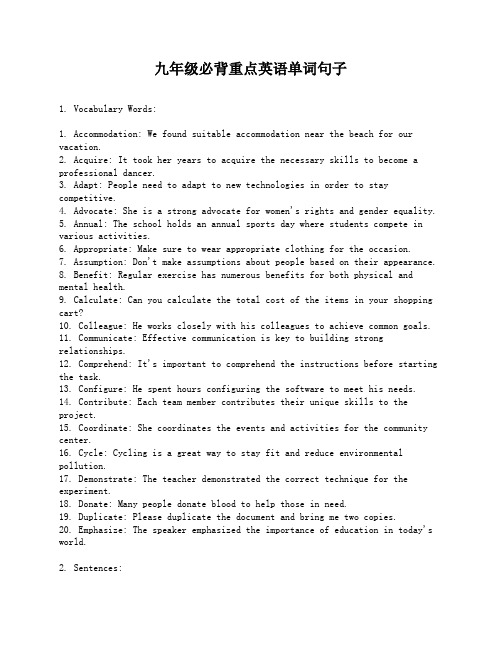
九年级必背重点英语单词句子1. Vocabulary Words:1. Accommodation: We found suitable accommodation near the beach for our vacation.2. Acquire: It took her years to acquire the necessary skills to become a professional dancer.3. Adapt: People need to adapt to new technologies in order to stay competitive.4. Advocate: She is a strong advocate for women's rights and gender equality.5. Annual: The school holds an annual sports day where students compete in various activities.6. Appropriate: Make sure to wear appropriate clothing for the occasion.7. Assumption: Don't make assumptions about people based on their appearance.8. Benefit: Regular exercise has numerous benefits for both physical and mental health.9. Calculate: Can you calculate the total cost of the items in your shopping cart?10. Colleague: He works closely with his colleagues to achieve common goals.11. Communicate: Effective communication is key to building strong relationships.12. Comprehend: It's important to comprehend the instructions before starting the task.13. Configure: He spent hours configuring the software to meet his needs.14. Contribute: Each team member contributes their unique skills to the project.15. Coordinate: She coordinates the events and activities for the community center.16. Cycle: Cycling is a great way to stay fit and reduce environmental pollution.17. Demonstrate: The teacher demonstrated the correct technique for the experiment.18. Donate: Many people donate blood to help those in need.19. Duplicate: Please duplicate the document and bring me two copies.20. Emphasize: The speaker emphasized the importance of education in today's world.2. Sentences:1. She aced the math test and was rewarded with a high grade.2. The teacher gave us a challenging assignment that required creativity.3. They arranged a meeting to discuss the upcoming school trip.4. The project was completed ahead of schedule, which impressed the client.5. He apologized for his mistake and promised to make it right.6. The book provided valuable insights into the history of ancient civilizations.7. The committee selected her as the winner of the prestigious scholarship.8. We celebrated her achievements by throwing a surprise party for her.9. They collaborated on a science project and won first place in the competition.10. The earthquake caused extensive damage to buildings in the area.11. He volunteered at the local shelter, offering his time to help those in need.12. The performance was cancelled due to the severe weather warning.13. She wrote a heartfelt letter to express her gratitude to her teacher.14. The team worked tirelessly to meet the tight deadline and delivered the project on time.15. He discovered a hidden talent for painting and decided to pursue it further.16. They organized a charity event to raise funds for the underprivileged children.17. The invention revolutionized the industry and transformed the way people worked.18. She overcame her fear of public speaking and delivered a powerful speech.19. The company implemented a new recycling program to reduce waste and promote sustainability.20. He saved up money and fulfilled his dream of traveling around the world.。
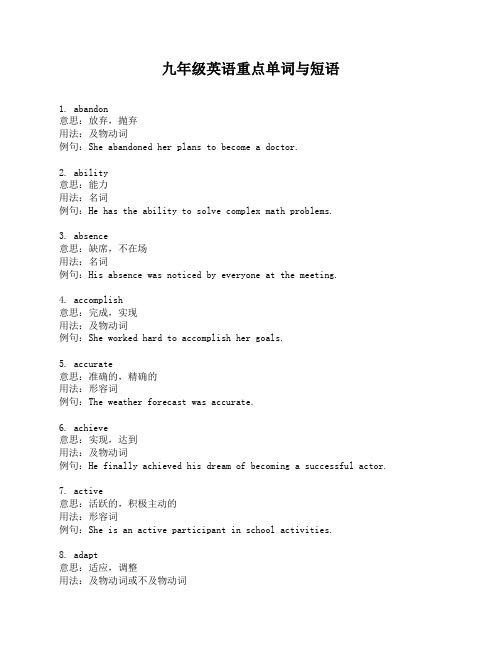
九年级英语重点单词与短语1. abandon意思:放弃,抛弃用法:及物动词例句:She abandoned her plans to become a doctor.2. ability意思:能力用法:名词例句:He has the ability to solve complex math problems.3. absence意思:缺席,不在场用法:名词例句:His absence was noticed by everyone at the meeting.4. accomplish意思:完成,实现用法:及物动词例句:She worked hard to accomplish her goals.5. accurate意思:准确的,精确的用法:形容词例句:The weather forecast was accurate.6. achieve意思:实现,达到用法:及物动词例句:He finally achieved his dream of becoming a successful actor.7. active意思:活跃的,积极主动的用法:形容词例句:She is an active participant in school activities.8. adapt意思:适应,调整用法:及物动词或不及物动词例句:It took her some time to adapt to the new school environment.9. admire意思:欣赏,羡慕用法:及物动词例句:I admire her dedication to her craft.10. adopt意思:采用,收养用法:及物动词例句:They decided to adopt a more environmentally friendly lifestyle.11. adult意思:成年人用法:名词例句:As an adult, he has more responsibilities.12. adventure意思:冒险,探险用法:名词例句:They went on an exciting adventure in the Amazon rainforest.13. advice意思:建议,忠告用法:名词例句:He gave me some good advice before the job interview.14. affect意思:影响,影响力用法:及物动词例句:The bad weather affected their travel plans.15. aim意思:目标,瞄准用法:名词或动词例句:My aim is to become a doctor. / He aimed carefully before shooting the target.16. alarm意思:警报,惊恐用法:名词或动词例句:The fire alarm alerted everyone in the building. / She was alarmed by the strange noise.17. allow意思:允许,准许用法:及物动词例句:Her parents allowed her to go to the party.18. although意思:虽然,尽管用法:连词例句:Although it was raining, they still went for a walk.19. amount意思:数量,总数用法:名词例句:The amount of homework he had was overwhelming.20. ancient意思:古代的,古老的用法:形容词例句:The ancient ruins fascinated the archaeologists.21. annoy意思:使烦恼,使生气用法:及物动词例句:His constant talking annoyed his classmates.22. anxious意思:焦虑的,担心的用法:形容词例句:She was anxious about her upcoming exams.23. apologize意思:道歉用法:不及物动词例句:He apologized for being late to the meeting.24. approach意思:接近,方法用法:名词或动词例句:He approached the teacher with his concerns. / The approach we took in solving the problem was successful.25. approve意思:批准,赞成用法:及物动词例句:The school approved the new curriculum.26. argue意思:争论,辩论用法:不及物动词例句:They argued about which movie to watch.27. arrange意思:安排,整理用法:及物动词例句:She arranged a meeting with her boss to discuss her promotion.28. ashamed意思:感到羞耻的用法:形容词例句:He felt ashamed of his actions.29. assistance意思:帮助,援助用法:名词例句:She offered her assistance to those in need.30. attack意思:攻击,袭击用法:名词或动词例句:The enemy launched a surprise attack. / The dog attacked the mailman.31. attitude意思:态度,看法用法:名词例句:His positive attitude helped him overcome obstacles.32. attract意思:吸引,引起兴趣用法:及物动词例句:The colorful advertisement attracted a lot of attention.33. avoid意思:避免,回避用法:及物动词例句:He tried to avoid making eye contact with her.34. base意思:基础,根据用法:名词或动词例句:The team's success is based on hard work and dedication. / They based their decision on the evidence provided.35. battle意思:战斗,战争用法:名词或动词例句:The soldiers fought bravely in the battle. / They battled through the difficult times together.36. behavior意思:行为,举止用法:名词例句:His rude behavior was unacceptable.37. benefit意思:利益,好处用法:名词或动词例句:Regular exercise has many benefits for your health. / She benefited greatly from the extra study time.38. betray意思:背叛,出卖用法:及物动词例句:He felt betrayed by his best friend.39. blame意思:责备,责怪用法:及物动词例句:She blamed herself for the failure.40. brave意思:勇敢的,勇敢地面对用法:形容词或副词例句:The firefighters were praised for their brave actions. / She faced her fears bravely.41. brilliant意思:出色的,聪明的用法:形容词例句:He came up with a brilliant idea to solve the problem.42. bubble意思:泡沫,气泡用法:名词或动词例句:The soap bubbles floated in the air. / The hot water bubbled in the pot.43. bury意思:埋葬,隐藏用法:及物动词例句:They buried their dog in the backyard. / He buried his feelings deep inside.44. calm意思:平静的,使平静用法:形容词或动词例句:The sea was calm and peaceful. / She tried to calm her nerves before the presentation.45. capture意思:捕获,俘虏用法:及物动词例句:The police captured the thief after a long chase.46. cautious意思:谨慎的,小心的用法:形容词例句:Be cautious when crossing the street.47. celebrate意思:庆祝用法:及物动词例句:They celebrated their team's victory with a party.48. challenge意思:挑战,艰巨任务用法:名词或动词例句:He accepted the challenge of climbing Mount Everest. / The difficult math problem challenged her.49. champion意思:冠军,支持用法:名词或动词例句:He won the championship in his tennis tournament. / She champions the rights of the underprivileged.50. charge意思:收费,指控用法:名词或动词例句:The store charges $10 for delivery. / He was charged with theft.51. cheat意思:作弊, **用法:不及物动词例句:He was caught cheating during the exam.52. check意思:检查,支票用法:动词或名词例句:She checked her email before leaving for work. / He wrote a check to pay for the groceries.53. cheer意思:欢呼,喝彩用法:动词或名词例句:The crowd cheered when their team scored a goal. / They spread cheer and happiness wherever they went.54. childhood意思:童年用法:名词例句:Her childhood memories were filled with laughter and joy.55. choice意思:选择,选择权用法:名词例句:You have to make a choice between the two options.56. civilization意思:文明,文化用法:名词例句:Ancient Egypt was known for its advanced civilization.57. claim意思:声称,要求用法:动词或名词例句:He claimed that he saw a UFO. / She made a claim against her insurance policy.58. clever意思:聪明的,机智的用法:形容词例句:She is a clever student who excels in all subjects.59. climate意思:气候,气氛用法:名词例句:The climate in this region is hot and humid.60. collapse意思:倒塌,崩溃用法:及物动词或不及物动词例句:The old building collapsed during the earthquake. / The team collapsed under the pressure.61. colleague意思:同事,同僚用法:名词例句:She works closely with her colleagues on various projects.62. colony意思:殖民地,群体用法:名词例句:The British established colonies in many parts of the world.63. combine意思:合并,结合用法:及物动词或不及物动词例句:They combined their resources to start a business. / The colors combine to create a beautiful painting.64. comfort意思:舒适,安慰用法:名词或动词例句:The cozy bed provided great comfort. / She comforted her friend during a difficult time.65. command意思:命令,指挥用法:名词或动词例句:He followed his commander's commands. / She commanded the attention of the audience.66. communicate意思:交流,沟通用法:及物动词或不及物动词例句:They used sign language to communicate with each other. / He communicated his ideas effectively through his presentation.67. compare意思:比较,对照用法:及物动词例句:She compared the two products before making a decision.68. complain意思:抱怨,投诉用法:不及物动词例句:He complained about the poor service at the restaurant.69. concentrate意思:集中,专心用法:不及物动词例句:He concentrated on his studies to achieve good grades.70. concern意思:关注,担心用法:名词或动词例句:His safety is our main concern. / She was concerned about her friend's health.71. confident意思:自信的,确信的用法:形容词例句:He felt confident about his chances of success.72. confuse意思:使困惑,混淆用法:及物动词例句:The instructions were confusing and difficult to follow.。
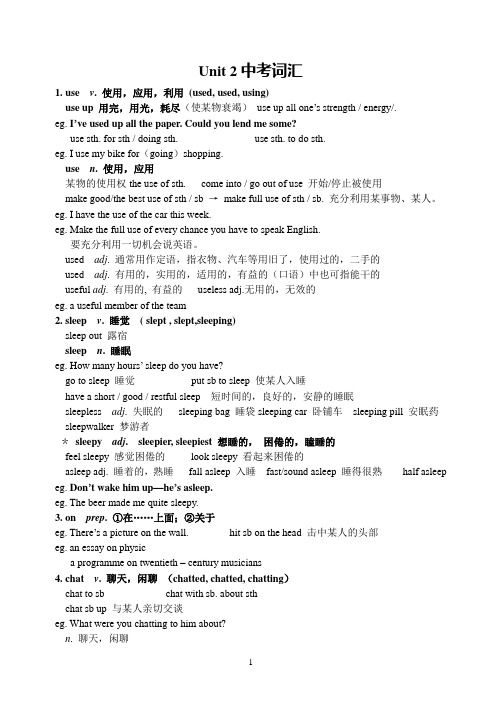
Unit 2中考词汇1. use v. 使用,应用,利用(used, used, using)use up 用完,用光,耗尽(使某物衰竭)use up all one’s strength / energy/.eg. I’ve used up all the paper. Could you lend me some?use sth. for sth / doing sth. use sth. to do sth.eg. I use my bike for(going)shopping.use n. 使用,应用某物的使用权the use of sth. come into / go out of use 开始/停止被使用make good/the best use of sth / sb→make full use of sth / sb. 充分利用某事物、某人。
eg. I have the use of the car this week.eg. Make the full use of every chance you have to speak English.要充分利用一切机会说英语。
used adj. 通常用作定语,指衣物、汽车等用旧了,使用过的,二手的used adj. 有用的,实用的,适用的,有益的(口语)中也可指能干的useful adj. 有用的, 有益的useless adj.无用的,无效的eg. a useful member of the team2. sleep v. 睡觉( slept , slept,sleeping)sleep out 露宿sleep n. 睡眠eg. How many hours’ sleep do you have?go to sleep 睡觉put sb to sleep 使某人入睡have a short / good / restful sleep 短时间的,良好的,安静的睡眠sleepless adj. 失眠的sleeping bag 睡袋sleeping car 卧铺车sleeping pill 安眠药sleepwalker 梦游者*sleepy adj. sleepier, sleepiest 想睡的,困倦的,瞌睡的feel sleepy 感觉困倦的look sleepy 看起来困倦的asleep adj. 睡着的,熟睡fall asleep 入睡fast/sound asleep 睡得很熟half asleep eg. Don’t wake him up—he’s asleep.eg. The beer made me quite sleepy.3. on prep.①在……上面;②关于eg. There’s a picture on the wall. hit sb on the head 击中某人的头部eg. an essay on physica programme on twentieth – century musicians4. chat v. 聊天,闲聊(chatted, chatted, chatting)chat to sb chat with sb. about sthchat sb up 与某人亲切交谈eg. What were you chatting to him about?n. 聊天,闲聊c.n. have a chat with sbu.n. That’s enough chat, go back to work! 别再聊了,回去工作吧!chatty adj. 爱闲聊的*5. daily adj. 每日的,日常的(通常用作定语)a daily visit daily life daily flights to Beijing a daily newspaperone’s daily bread→one’s daily foodeg. That’s how I earn my daily bread. 我是这样维持生计的daily n. 日报daily adv. 每日,每天eg. The zoo is open daily, from 9am to 5pm.. 机器每日均经检查6. die v. (died, died, dying)eg. My grandfather died at the age of 86.die of/from 死于eg.The animal died of/from hunger and cold in the snow.His grandfather died of a heart attack. Some people died from a traffic accident.die away 减弱(以至于察觉不到),淡化die down 减弱,降低die off 死去,先后死去die out (指家族,物种)灭绝dead adj. 死的,死气沉沉的,无生命的a dead person / animaleg. The town is dead now the mine has closed. 因矿井关闭,镇上一片死气沉沉。
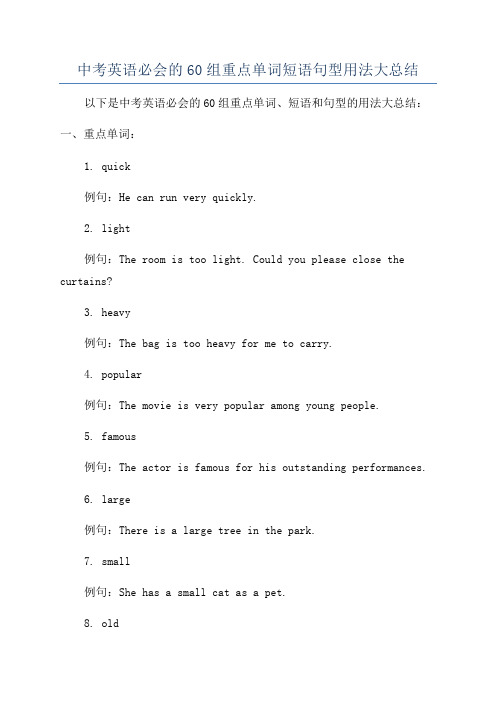
中考英语必会的60组重点单词短语句型用法大总结以下是中考英语必会的60组重点单词、短语和句型的用法大总结:一、重点单词:1. quick例句:He can run very quickly.2. light例句:The room is too light. Could you please close the curtains?3. heavy例句:The bag is too heavy for me to carry.4. popular例句:The movie is very popular among young people.5. famous例句:The actor is famous for his outstanding performances.6. large例句:There is a large tree in the park.7. small例句:She has a small cat as a pet.8. old例句:My grandfather is 80 years old.9. young例句:He is too young to drive a car.10. beautiful例句:The sunset is so beautiful.11. ugly例句:The painting is very ugly.12. clean例句:Please keep your room clean.13. dirty例句:His clothes are dirty after playing in the mud. 14. hard例句:It's hard for me to solve the math problem.15. easy例句:The question is very easy. I can answer it easily.16. good例句:He is a good student. He always gets high marks.17. bad例句:He is a bad boy. He always causes trouble.18. young例句:He is too young to drive a car.19. old例句:My grandfather is 80 years old.20. high例句:The mountain is very high.21. low例句:The temperature is very low today.22. deep例句:The river is deep. Be careful when swimming.23. thin例句:She is very thin. I'm worried about her health. 24. fat例句:He is too fat. He needs to go on a diet.25. long26. short例句:The dress is too short. I need to buy a longer one.27. happy例句:She is very happy because she won the game.28. sad例句:The boy is sad because he lost his toy.29. helpful例句:Thank you for your helpful advice.30. careful例句:Please be careful when crossing the road.二、重点短语:1. get up例句:I usually get up at 7 o'clock in the morning.2. go to bed例句:You should go to bed early to get enough sleep.4. get on例句:Please get on the bus quickly.5. get off例句:We need to get off at the next stop.6. take off例句:You need to take off your shoes before entering the house.7. put on例句:She put on her coat because it was cold outside.8. turn on9. turn off例句:Don't forget to turn off the lights when you leave the room.10. look after例句:Can you please look after my cat while I'm away?11. take care of例句:She takes good care of her little sister.12. make up例句:They had a fight yesterday, but they made up this morning.13. break up例句:They broke up after dating for three years.14. try on例句:You can try on this dress to see if it fits you.15. try out例句:He is trying out for the school basketball team.16. give up例句:Don't give up easily. Keep trying and you'll succeed.17. get along (with)例句:She gets along very well with her classmates.18. look for例句:I'm looking for my keys. Have you seen them?19. take off例句:You should take off your hat when you enter a building.20. put on例句:Please put on your seatbelt before the plane takes off.三、重点句型:1. There is/are...例句:There is a book on the table.2. How many/much... are there?例句:How many apples are there in the basket?3. What's the weather like?例句:What's the weather like today? Is it sunny?4. What's your favorite...?例句:What's your favorite color? Mine is blue.5. What do you think of...?例句:What do you think of the movie? I think it's great.6. How often do you...?7. How long does it take to...?例句:How long does it take to get to school? It takes about 20 minutes.9. How do you get to...?例句:How do you get to the library? I usually take a bus.10. What's your hobby?例句:What's your hobby? My hobby is playing the piano.以上是中考英语必会的60组重点单词、短语和句型的用法大总结。
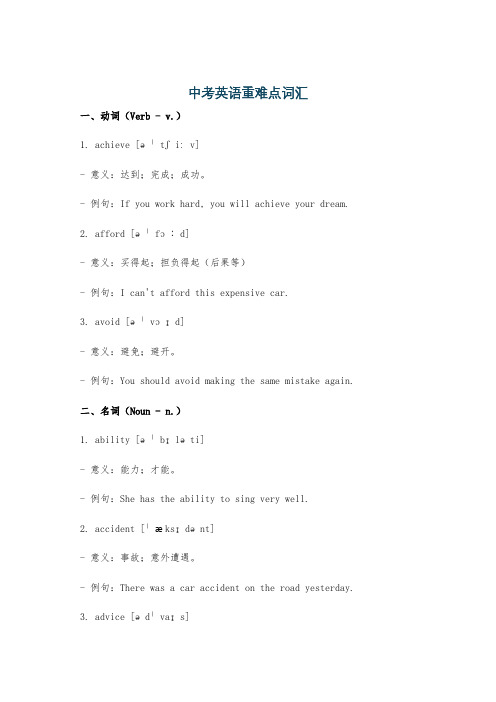
中考英语重难点词汇一、动词(Verb - v.)1. achieve [əˈtʃiːv]- 意义:达到;完成;成功。
- 例句:If you work hard, you will achieve your dream.2. afford [əˈfɔːd]- 意义:买得起;担负得起(后果等)- 例句:I can't afford this expensive car.3. avoid [əˈvɔɪd]- 意义:避免;避开。
- 例句:You should avoid making the same mistake again.二、名词(Noun - n.)1. ability [əˈbɪləti]- 意义:能力;才能。
- 例句:She has the ability to sing very well.2. accident [ˈæksɪdənt]- 意义:事故;意外遭遇。
- 例句:There was a car accident on the road yesterday.3. advice [ədˈvaɪs]- 意义:劝告;建议(不可数名词)- 例句:Can you give me some advice on how to learn English?三、形容词(Adjective - adj.)1. active [ˈæktɪv]- 意义:活跃的;积极的。
- 例句:He is an active boy in class.2. afraid [əˈfreɪd]- 意义:害怕的;担心的。
- 例句:She is afraid of dogs.3. amazing [əˈmeɪzɪŋ]- 意义:令人大为惊奇的;令人惊喜(惊叹)的。
- 例句:The magic show was really amazing.。

初中英语词汇精华——例句记忆编者按:词汇必须放在语言环境中记忆,这才是透彻理解的基础,本文档集合人教版新课标初中英语教材及试卷最容易涉及的1000多个精华词汇并配上例句,让学生在例句中记忆理解,效果更佳。
——河南济源张晨搜集整理Aa bit 有点儿I feel a bit lonely from time to time(有时).a bit of 后跟名词Today I only have a bit of housework.a little 有点儿(可修饰比较级)Lily is 1.65 meters tall, I am 1.63. She is a little taller than I.ability 能力Different people have different abilities.above 在⋯的上面Wilson lives two floors above Wendy.below 在⋯的下面Mary lives six floors below Wendy.over 在⋯的上方There is a bridge over the river.under 在⋯的下方There is a bike under the tree.on 在⋯的上面There is a book on the desk.absent 缺席的;He will be absent from the meeting tomorrow.abroad 到国外;Steven has been working abroad for five years.accept 接受Do you accept what he told you?accident 事故The car accident killed three men yesterday.across prep.穿过Go across the road and walk on,you will see the bookshop.cross vt.穿过Cross the road and you’ll see the museum.through prep.通过The sun is shining through the window.action n.行动We can take the following actions to protect giant pandas.active adj.积极的You are energetic and active,but sometimes too impatient.achieve 获得,实现;Many people will work hard to achieve these goals.activity n.活动;You can take part in activities from canoeing(独木舟)to bird watching. advanced 先进的,高级的;The company bought many advanced equipment last year.adventure 冒险,奇遇;I set off for a new adventure in the United States.advantage n.优势;Our advantage is we are familiar with all the roads.I will take advantage of (利用) this trip to buy all the things that we need. advertise 登广告;They put some advertisement(名词)on the newspaper.advise vt.建议Our English teacher advises us to speak English as much as possible.n.建议I don’ t know how to learn English well.I hope you can give me some advice. afraid adj.担心I’m afraid of snakes. Don’t be afraid to ask questions.affect vt.影响;affect one’s mood感染某人的情绪afford vt买得起;The car is so expensive that we can’t be able to afford it.agree vi.同意,赞同I agree with your parents that it is better for you to go home earlier. agreement n.协议,同意They reached agreement finally.agriculture 农业;Agriculture is very important for all the countries.against prep.反对,违反He is wanted(被通缉)because he has done something against the law. ago adv. 以前two years ago 两年前three seconds ago 三秒种前before prep. 在⋯以前I like reading English before I go to bed.air 1)n. 空气,大气There isn’t air or water on the moon.2)v. 使通风We should air the rooms every day in spring.allow vt.允许My parents don’t allow me to play outside after 6 p.m.alone adv./ adj.独自,单独The old man lives alone,but he doesn’t feel lonely.along prep.沿着I get along well with(与…相处融洽)all my classmates.although conj.虽然(不能和but 连用)Although he studies hard, he can’t catch up with others.also adv.也He is also wearing a pair of colourful trainers(跑鞋).too adv.也He likes reading. I like reading,too = I also like reading.as well 也I want to read the book as well.either adv/prep也He doesn’t like running,I don’t either.amazing 令人吃惊的It is one of the most amazing films I’ve ever seen.ambulance 救护车The hospital bought many ambulances last year.among prep. 在三者或以上中间The teacher stands among the students.Between prep. 在两者之间There is a railway between the two cities.announce 宣布The director announced that we had won the competition.anxious 焦虑的,渴望的He is very anxious to go aboard.angry adj.生气的,愤怒的His parents became angry when he made the same mistake again. appearance n.出现,相貌She made her final appearance on the screen.apologize 道歉;I need to apologize for what I did.appreciate 感激,欣赏We appreciate what you did for us.application 申请,应用His application for membership of the organization was rejected. appetite 食欲He has very good appetite recently.argue vi.辩论,争辩I love peace and do not like to argue with others.arrive vi. 到达arrive at/in a place = reach a place 到达某地asleep adj.睡着的he was too tied and fall asleep at once .ashamed 羞愧的I felt incredibly ashamed of myself for getting so angry.astronaut 宇航员I saw an astronaut driving the spacecraft.assume vt.假定,承担We can assume that the moon will continue to go around the earth forever.We will assume the responsibility if we make the mistake.attention n. 注意,专心You should pay attention to your spoken English.athletic 运动的They have been given college scholarships purely on athletic ability. attitude 态度The waiter in the restaurant has very good attitude to the customers. atmosphere 大气,气氛very good atmosphere 很好的气氛或氛围attempt 企图,尝试We are attempting to persuade him to work for our company.attract vt.吸引In order to attract the investors, Chinese government has reduced the taxes.audience 听众All the audience were attracted by his performance.average 平均The yearly average income of individual in China is 8000 USD.awake adj.醒着的Suzy was still awake at 12 o’clock last night.award n. 奖品Music AwardsBbadly adv.拙劣地,糟糕地Our team played badly at first but got better in the second half.balance 平衡;The medicines you are currently taking could be affecting your balance.battery 电池The battery is being charged in the room.battle n.战役,v.作战Thousands of people battled with police and several were reportedly wounded.He was attacked and got injured in the battle.bargain 讨价还价;We always bargain with the sellers in the market.basic 基本的;基础的We provide 2-person tents and basic cooking and camping equipment.beauty n.美,美丽Walk slowly around the lake and feel the beauty of the old park.become vi.成为,变得I want to become a famous singer and travel around the world in the future. begin/start vi./vt. 开始He began to learn English when he was six years old.当他6岁时就开始学英语。
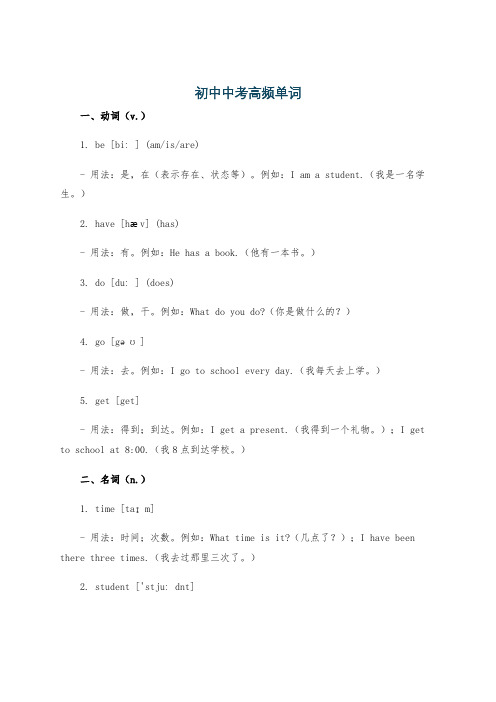
初中中考高频单词一、动词(v.)1. be [biː] (am/is/are)- 用法:是,在(表示存在、状态等)。
例如:I am a student.(我是一名学生。
)2. have [hæv] (has)- 用法:有。
例如:He has a book.(他有一本书。
)3. do [duː] (does)- 用法:做,干。
例如:What do you do?(你是做什么的?)4. go [gəʊ]- 用法:去。
例如:I go to school every day.(我每天去上学。
)5. get [get]- 用法:得到;到达。
例如:I get a present.(我得到一个礼物。
);I get to school at 8:00.(我8点到达学校。
)二、名词(n.)1. time [taɪm]- 用法:时间;次数。
例如:What time is it?(几点了?);I have been there three times.(我去过那里三次了。
)2. student ['stjuːdnt]- 用法:学生。
例如:There are many students in the classroom.(教室里有很多学生。
)3. school [skuːl]- 用法:学校。
例如:Our school is very beautiful.(我们的学校非常漂亮。
)4. family ['fæməli]- 用法:家庭;家人。
例如:My family is big.(我的家庭很大。
);My family like to travel.(我的家人喜欢旅行。
)5. friend [frend]- 用法:朋友。
例如:He is my best friend.(他是我最好的朋友。
)三、形容词(adj.)1. good [gʊd]- 用法:好的。
例如:He is a good boy.(他是一个好男孩。
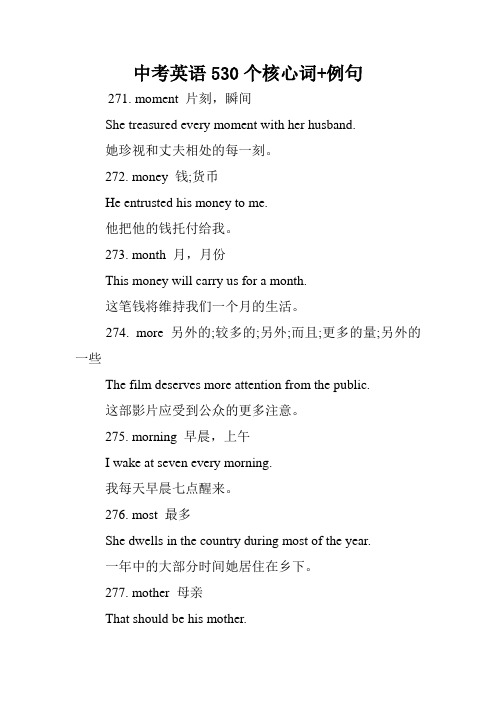
中考英语530个核心词+例句271. moment 片刻,瞬间She treasured every moment with her husband.她珍视和丈夫相处的每一刻。
272. money 钱;货币He entrusted his money to me.他把他的钱托付给我。
273. month 月,月份This money will carry us for a month.这笔钱将维持我们一个月的生活。
274. more 另外的;较多的;另外;而且;更多的量;另外的一些The film deserves more attention from the public.这部影片应受到公众的更多注意。
275. morning 早晨,上午I wake at seven every morning.我每天早晨七点醒来。
276. most 最多She dwells in the country during most of the year.一年中的大部分时间她居住在乡下。
277. mother 母亲That should be his mother.那大概是他的母亲。
278. move 移动,搬动,搬家He came to help us move.他是来帮我们搬家的。
279. Mr.(mister) 先生(用于姓名前)She maided for Mr.Killin.她当基林先生的女仆。
280. Mrs.(mistress) 夫人,太太(称呼已婚妇女)Mrs. John divorced her husband.琼斯太太与她丈夫离婚了。
281. Ms. 女士(用在婚姻状况不明的女子姓名前)“I have to create good circumstances for him,” said Ms. Wang.“我得为他创造良好的生活环境,” 王女士说。
282. much(more,most) 许多的,大量的The teacher expects much of me.老师对我寄予很大希望。
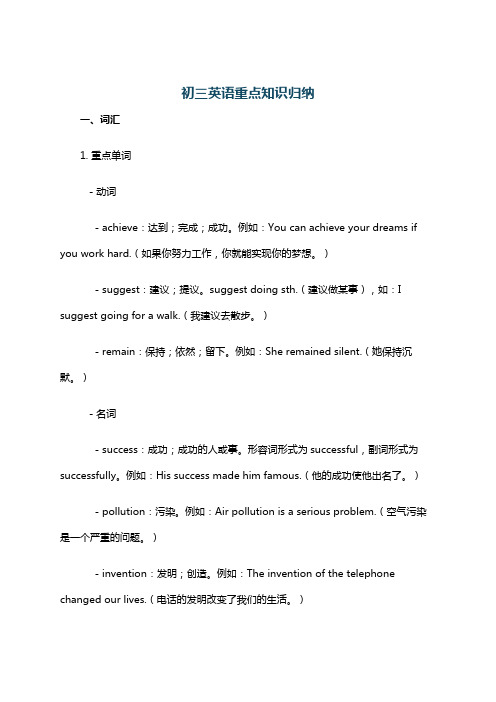
初三英语重点知识归纳一、词汇1. 重点单词- 动词- achieve:达到;完成;成功。
例如:You can achieve your dreams if you work hard.(如果你努力工作,你就能实现你的梦想。
)- suggest:建议;提议。
suggest doing sth.(建议做某事),如:I suggest going for a walk.(我建议去散步。
)- remain:保持;依然;留下。
例如:She remained silent.(她保持沉默。
)- 名词- success:成功;成功的人或事。
形容词形式为successful,副词形式为successfully。
例如:His success made him famous.(他的成功使他出名了。
) - pollution:污染。
例如:Air pollution is a serious problem.(空气污染是一个严重的问题。
)- invention:发明;创造。
例如:The invention of the telephone changed our lives.(电话的发明改变了我们的生活。
)- 形容词- confident:自信的;有信心的。
be confident of sth.(对某事有信心),如:He is confident of passing the exam.(他有信心通过考试。
) - dangerous:危险的。
名词形式为danger。
例如:It is dangerous to swim in this river.(在这条河里游泳是危险的。
)- active:积极的;活跃的。
例如:He is an active student in class.(他在课堂上是一个积极的学生。
)2. 词汇拓展- able(形容词,能够的) - ability(名词,能力) - enable(动词,使能够)。

中考英语重点单词和短语用法总结1.单词:- appreciate: 表示感谢或欣赏,后接名词/动名词。
例如:I appreciate your help. (我感谢你的帮助。
)- revise: 表示复习,后接名词/动名词。
例如:I need to revise for the test. (我需要为考试复习。
)- predict: 表示预测,常与will连用。
例如:I predict that it will rain tomorrow. (我预计明天会下雨。
)2.短语:- put off: 表示推迟。
例如:I had to put off the meeting because of a scheduling conflict. (由于时间冲突,我不得不推迟会议。
- look forward to: 表示期待。
例如:I'm looking forward to the summer vacation. (我期待着暑假。
)- take part in: 表示参加。
例如:I'm going to take part in the school talent show. (我打算参加学校的才艺表演。
)- get along with: 表示与...相处。
例如:She gets along well with her classmates. (她与她的同学们相处得很好。
)这些单词和短语在中考英语中经常出现,掌握它们的用法对于提高中考英语成绩具有重要的作用。
通过练习和使用这些单词和短语,可以加强对它们的理解和运用能力。
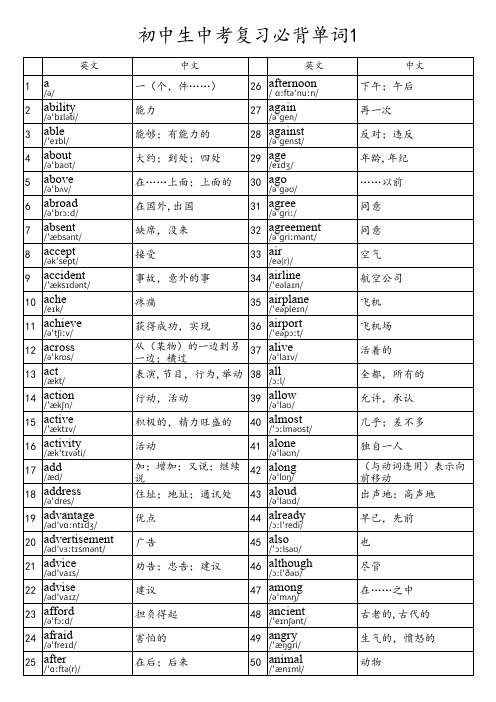
初中生中考复习必背单词1 英文 中文 英文 中文1a/ə/一(个,件……)26afternoon/ˌɑːftəˈnuːn/下午;午后2ability/əˈbɪləti/能力27again/əˈɡen/再一次3able/ˈeɪbl/能够;有能力的28against/əˈɡenst/反对;违反4about/əˈbaʊt/大约;到处;四处29age/eɪdʒ/年龄,年纪5above/əˈbʌv/在……上面;上面的30ago/əˈɡəʊ/……以前6abroad/əˈbrɔːd/在国外,出国31agree/əˈɡriː/同意7absent/ˈæbsənt/缺席,没来32agreement/əˈɡriːmənt/同意8accept/əkˈsept/接受33air/eə(r)/空气9accident/ˈæksɪdənt/事故,意外的事34airline/ˈeəlaɪn/航空公司10ache/eɪk/疼痛35airplane/ˈeəpleɪn/飞机11achieve/əˈtʃiːv/获得成功,实现36airport/ˈeəpɔːt/飞机场12across/əˈkrɒs/从(某物)的一边到另一边;横过37alive/əˈlaɪv/活着的13act/ækt/表演,节目,行为,举动38all/ɔːl/全都,所有的14action/ˈækʃn/行动,活动39allow/əˈlaʊ/允许,承认15active/ˈæktɪv/积极的,精力旺盛的40almost/ˈɔːlməʊst/几乎;差不多16activity/ækˈtɪvəti/活动41alone/əˈləʊn/独自一人17add/æd/加;增加;又说;继续说42along/əˈlɒŋ/(与动词连用)表示向前移动18address/əˈdres/住址;地址;通讯处43aloud/əˈlaʊd/出声地;高声地19advantage/ədˈvɑːntɪdʒ/优点44already/ɔːlˈredi/早已,先前20advertisement /ədˈvɜːtɪsmənt/广告45also/ˈɔːlsəʊ/也21advice/ədˈvaɪs/劝告;忠告;建议46although/ɔːlˈðəʊ/尽管22advise/ədˈvaɪz/建议47among/əˈmʌŋ/在……之中23afford/əˈfɔːd/担负得起48ancient/ˈeɪnʃənt/古老的,古代的24afraid/əˈfreɪd/害怕的49angry/ˈæŋɡri/生气的,愤怒的25after/ˈɑːftə(r)/在后;后来50animal/ˈænɪml/动物51another /əˈnʌðə(r)/再一,另一;另一个77aunt/ɑːnt/姨母;姨母 姑母;伯母;婶母52/ˈɑːnsə(r)/answer 回答;答复78Australia /ɒˈstreɪliə/澳大利亚53ant/ænt/蚂蚁79Australian/ɒˈstreɪliən/澳大利亚的,澳大利亚人54any/ˈeni/(无论)哪一个;哪些;任何的80available/əˈveɪləbl/可利用的55anybody /ˈenibɒdi/任何人,无论谁81autumn/ˈɔːtəm/秋天56anyone/ˈeniwʌn/任何人,无论谁82avoid/əˈvɔɪd/避免57anything /ˈeniθɪŋ/什么 ;无论什么83awake/əˈweɪk/醒着的58anywhere/ˈeniweə(r)/(用于否定句中)到处;无论哪里84away/əˈweɪ/向远处;在远处59appear /əˈpɪə(r)/出现85baby /ˈbeɪbi/婴儿;小孩60apple /ˈæpl/苹果86back/bæk/后背;背脊61April/ˈeɪprəl/四月87background/ˈbækɡraʊnd/背景62area /ˈeəriə/地区,面积88bad /bæd/(比较级 worse ,最高级worst)坏的;劣质的63arm/ɑːm/臂;胳膊89ball/bɔːl/球64around /əˈraʊnd/大约90balloon /bəˈluːn/气球65arrive /əˈraɪv/到达;抵达91bamboo /ˌbæmˈbuː/竹子66art/ɑːt/艺术;美术;艺术品92bag/bæɡ/书包;提包;口袋67article /ˈɑːtɪkl/文章93banana/bəˈnɑːnə/香蕉68as/əz/像 ……一样;如同;作为,当作94bank /bæŋk/银行69Asia/ˈeɪʒə/亚洲95baseball /ˈbeɪsbɔːl/棒球70Asian /ˈeɪʒ(ə)n/亚洲的,亚洲人96basic/ˈbeɪsɪk/基本的,基础的71ask/ɑːsk/问;询问97basket/ˈbɑːskɪt/篮子72asleep /əˈsliːp/睡着的98basketball/ˈbɑːskɪtbɔːl/篮球73at/ət/在(里面或附近),在(点刻)99bathroom /ˈbɑːθruːm/浴室;洗澡间74Atlantic/ətˈlæntɪk/大西洋100be/bi/是75attention /əˈtenʃn/注意,专心,注意力101beach /biːtʃ/海滩;湖滩76August/ˈɔːɡəst/八月102bear/beə(r)/熊103beat/biːt/敲打;跳动;打赢129biscuit/ˈbɪskɪt/饼干104beautiful/ˈbjuːtɪfl/美丽的,美观的130bit/bɪt/一点,少量的105because/bɪˈkəz/因为131bitter/ˈbɪtə(r)/苦的106become/bɪˈkʌm/成为;变成132black/blæk/黑色的;黑色107bed/bed/床133blackboard/ˈblækbɔːd/黑版108bedroom/ˈbedruːm/寝室;卧室;卧房134blind/blaɪnd/失明的109bee/biː/蜜蜂135blood/blʌd/血液110beef/biːf/牛肉136blow/bləʊ/击;打击111before/bɪˈfɔː(r)/在……以前;在……之前137blue/bluː/蓝色的;蓝色112begin/bɪˈɡɪn/开始138board/bɔːd/甲板113behaviour/bɪˈheɪvjə(r)/行为,举止139boat/bəʊt/小船114behind/bɪˈhaɪnd/在……的后面140body/ˈbɒdi/身体;躯体;肉体115believe/bɪˈliːv/相信141book/bʊk/书116bell/bel/钟;铃142boring/ˈbɔːrɪŋ/无聊的;令人生厌的117below/bɪˈləʊ/在…下面,低于…143born/bɔːn/出生118beside/bɪˈsaɪd/在……旁边;靠近144borrow/ˈbɒrəʊ/借;借入;借来119besides/bɪˈsaɪdz/除了……145boss/bɒs/老板120between/bɪˈtwiːn/介于(两者或多者)之间;在……中间146both/bəʊθ/二者;两者都121beyond/bɪˈjɒnd/超出,越过……147bottle/ˈbɒtl/瓶子122bicycle=bike自行车;两轮脚踏车148bottom/ˈbɒtəm/底部123big/bɪɡ/大的149bowl/bəʊl/碗;钵124bike=bicycle自行车;两轮脚踏车150box/bɒks/盒子,箱子125bill/bɪl/帐单151boy/bɔɪ/男孩126bird/bɜːd/鸟152brain/breɪn/大脑127birth/bɜːθ/出生,诞生153brave/breɪv/勇敢的,无畏的128birthday/ˈbɜːθdeɪ/生日154bread/bred/面包155break/breɪk/打破(断,碎);损坏,撕开181calm/kɑːm/镇静的;无忧虑的156breakfast/ˈbrekfəst/早餐182camera/ˈkæmrə/照相机157breath/breθ/呼吸183camp/kæmp/营地158breathe/briːð/吸气,呼吸184can/kən/能;可以;会 ; 金属罐159bridge/brɪdʒ/桥185Canada/ˈkænədə/加拿大(北美洲)160bright/braɪt/明亮的,聪明的186cancel/ˈkænsl/取消161bring/brɪŋ/拿来,带来,取来187candle/ˈkændl/蜡烛162brother/ˈbrʌðə(r)/兄;弟188cancer/ˈkænsə(r)/癌症163brown/braʊn/棕色的;褐色的189candy/ˈkændi/糖果164brush/brʌʃ/刷;擦190capital/ˈkæpɪtl/省会,首都165build/bɪld/构筑,建造,建筑191cap/kæp/帽子166building/ˈbɪldɪŋ/房屋;建筑物192capital/ˈkæpɪtl/首都167burn/bɜːn/烧伤,烧坏;n. 火、热或酸所造成的伤害或伤痕193captain/ˈkæptɪn/船长,队长168bus/bʌs/公共汽车194car/kɑː(r)/小汽车169business/ˈbɪznəs/商业,买卖,交易195card/kɑːd/卡片,名片,纸牌170busy/ˈbɪzi/忙的;忙碌的;繁忙的196care/keə(r)/关心,忧虑171but/bət/但是197careful/ˈkeəfl/小心的;仔细的172butter/ˈbʌtə(r)/黄油198careless/ˈkeələs/粗心的173butterfly/ˈbʌtəflaɪ/蝴蝶199carry/ˈkæri/搬运,携带174buy/baɪ/买;购买;采购200cat/kæt/猫175by/baɪ/由,被;在…以前,不晚于201catch/kætʃ/捕获,赶上(车船等)176bye/baɪ/再见202cause/kɔːz/起因,导致177cabbage/ˈkæbɪdʒ/卷心菜203CD/ˌsiː ˈdiː/激光唱片(缩写词)178cake/keɪk/蛋糕;糕饼类食品204ceiling/ˈsiːlɪŋ/天花板179call/kɔːl/喊叫,打电话205celebrate/ˈselɪbreɪt/庆祝,祝贺180camel/ˈkæml/骆驼206cent/sent/美分207center/ˈsentə(r)/中心;中央224child/tʃaɪld/孩子208century/ˈsentʃəri/世纪225China/ˈtʃaɪnə/中国209certain/ˈsɜːtn/当然,确定226Chinese/ˌtʃaɪˈniːz/中国人,汉语;中国的210chair/tʃeə(r)/椅子227chocolate/ˈtʃɒklət/巧克力211chairman/ˈtʃeəmən/主席228choice/tʃɔɪs/选择;212chalk/tʃɔːk/粉笔229choose/tʃuːz/选择;挑选213chance/tʃɑːns/机会230chopsticks/ˈtʃɒpstɪks/筷子214change/tʃeɪndʒ/变,改变231Christmas/ˈkrɪsməs/圣诞节215cheap/tʃiːp/便宜的232church/tʃɜːtʃ/教堂216check/tʃek/核对,检查233cinema/ˈsɪnəmə/电影院217cheer/tʃɪə(r)/欢呼;喝彩234circle/ˈsɜːkl/圆形;圈;环;圈子,阶层218chess/tʃes/国际象棋235city/ˈsɪti/城市;都市;市219chemistry/ˈkemɪstri/化学236clap/klæp/鼓掌,掌声220chess/tʃes/象棋237class/klɑːs/班级;课;等级;类别221chest/tʃest/胸膛,胸脯238classmate/ˈklɑːsmeɪt/同班同学222chicken/ˈtʃɪkɪn/鸡;鸡肉239classroom/ˈklɑːsruːm/教室223children/ˈtʃɪldrən/孩子们240clean/kliːn/使清洁;弄干净;清洁的;干净的初中生中考复习必背单词2英文 中文 英文 中文1clear/klɪə(r)/清晰的;明亮的;清楚的26company/ˈkʌmpəni/同伴;陪伴;公司2clever/ˈklevə(r)/聪明的;机敏的27compare/kəmˈpeə(r)/比较3climb/klaɪm/攀登;攀爬;爬上28competition/ˌkɒmpəˈtɪʃn/竞赛4clock/klɒk/钟29complete/kəmˈpliːt/完整的;完全的5clone/kləʊn/克隆30computer/kəmˈpjuːtə(r)/电脑;电子计算机6close/kləʊz/近的;接近的;关闭31concert/ˈkɒnsət/音乐会7clothes/kləʊðz/衣服,各种衣物32condition/kənˈdɪʃn/条件8cloud/klaʊd/云彩33conference/ˈkɒnfərəns/会议9cloudy/ˈklaʊdi/多云的;乌云密布的34connect/kəˈnekt/连接10club/klʌb/俱乐部35consider/kənˈsɪdə(r)/考虑11coach/kəʊtʃ/教练,长途汽车36continue/kənˈtɪnjuː/继续12coal/kəʊl/煤37control/kənˈtrəʊl/控制13coast/kəʊst/海岸38conversation/ˌkɒnvəˈseɪʃn/对话14coat/kəʊt/外套39cook/kʊk/厨师15coffee/ˈkɒfi/咖啡40cooker/ˈkʊkə(r)/厨具16coin/kɔɪn/钱币,硬币41cool/kuːl/凉的;棒的;使变凉;使冷静17Coke/kəʊk/可乐42copy/ˈkɒpi/抄写;抄袭18cold/kəʊld/冷的;寒冷的;伤风;感冒43corner/ˈkɔːnə(r)/角,角落,拐角19collect/kəˈlekt/收集;搜集;收藏44correct/kəˈrekt/对的,正确的,准确的20college/ˈkɒlɪdʒ/高等教育机关;专科学校;学院45cost/kɒst/价值(若干);花(多少钱)21colour/ˈkʌlə(r)/颜色;给 ……着色,图色46cotton/ˈkɒtn/棉花,棉制的22come/kʌm/来47cough/kɒf/咳嗽23comfortable /ˈkʌmftəbl/舒适的;安逸的48could/kəd/能24common/ˈkɒmən/共同的49count/kaʊnt/计;值25communication /kəˌmjuːnɪˈkeɪʃn/交流50country/ˈkʌntri/国家;乡村;51countryside /ˈkʌntrisaɪd/郊外,野外,乡村77deaf /def/聋的52couple /ˈkʌpl/夫妇78deal/diːl/协议,交易53courage/ˈkʌrɪdʒ/勇气,胆量79dear/dɪə(r)/亲爱的54course /kɔːs/课程80death/deθ/死,死亡55cousin/ˈkʌzn/堂(表)兄弟;堂(表)姐妹81December/dɪˈsembə(r)/十二月56/ˈkʌvə(r)/cover 覆盖,遮掩82decide/dɪˈsaɪd/决定;下决心;解决57cow/kaʊ/母牛,奶牛83decision /dɪˈsɪʒn/决定;58crayon /ˈkreɪən/蜡笔84deep /diːp/深的59crazy/ˈkreɪzi/古怪的;荒唐的85degree/dɪˈɡriː/度数60create /kriˈeɪt/创造86delicious/dɪˈlɪʃəs/美味的;可口的61cross/krɒs/十字形的东西;穿过,越过87dentist /ˈdentɪst/牙医62culture /ˈkʌltʃə(r)/文化88depend/dɪˈpend/依赖,依靠63cry/kraɪ/喊叫;哭89describe /dɪˈskraɪb/描述64cup /kʌp/小茶杯,一杯的容量90desk/desk/书桌,写字台65cut/kʌt/剪;切;割91develop /dɪˈveləp/发展66dad/dæd/爸爸92development/dɪˈveləpmənt/发展67daily /ˈdeɪli/每日的93dialogue /ˈdaɪəlɒɡ/对话68dance/dɑːns/跳舞;舞蹈94diary/ˈdaɪəri/日记69danger/ˈdeɪndʒə(r)/危险95dictionary /ˈdɪkʃənri/字典,辞典70dangerous /ˈdeɪndʒərəs/危险的96die/daɪ/死71dare/deə(r)/敢于97difference/ˈdɪfrəns/不同;差异;区别72dark /dɑːk/黑暗(的);暗(的)98different /ˈdɪfrənt/不同的,有差异的73date/deɪt/日期99difficult/ˈdɪfɪkəlt/困难的74daughter /ˈdɔːtə(r)/女儿100difficulty/ˈdɪfɪkəlti/困难,难处75day/deɪ/白天;一天101dig/dɪɡ/挖(洞、沟等);掘76dead /ded/死的102dinner/ˈdɪnə(r)/正餐;晚餐103direct/dəˈrekt/笔直的,径直的129dream/driːm/梦想104direction/dəˈrekʃn/方向130dress/dres/女服,连衣裙105director/dəˈrektə(r)/主管,负责人131drink/drɪŋk/喝,饮;饮料106dirty/ˈdɜːti/肮脏的132drive/draɪv/驾驶;驾车;107discover/dɪˈskʌvə(r)/发现133driver/ˈdraɪvə(r)/驾驶员;司机108discovery/dɪˈskʌvəri/发现134drop/drɒp/雨滴,露珠;落下109discuss/dɪˈskʌs/讨论135drug/drʌɡ/药物110discussion/dɪˈskʌʃn/讨论136drum/drʌm/鼓111disease/dɪˈziːz/疾病137dry/draɪ/使……干;弄干;擦干112dish/dɪʃ/盘,碟,装菜盘138dry/draɪ/干的;干燥的113dismiss/dɪsˈmɪs/开除,解散139duck/dʌk/鸭子114disturb/dɪˈstɜːb/搅乱,打扰140dumpling/ˈdʌmplɪŋ/饺子115divide/dɪˈvaɪd/分开,分割141during/ˈdjʊərɪŋ/在……期间;在(某段时间)内116do/duː/做;干;行动;(助动词无意义)142duty/ˈdjuːti/责任,义务117doctor/ˈdɒktə(r)/医生143each/iːtʃ/每人,每个,每件118dog/dɒɡ/狗;犬144ear/ɪə(r)/耳朵119doll/dɒl/布娃娃145early/ˈɜːli/早的;早地120dollar/ˈdɒlə(r)/元(美元、加拿大等国的货币单位)146earth/ɜːθ/地球;陆地121door/dɔː(r)/门147east/iːst/东方的,东部的;东,东部122double/ˈdʌbl/双倍的148easy/ˈiːzi/容易的,123doubt/daʊt/怀疑149eat/iːt/吃124down/daʊn/在或向低处;沿着,顺着150edge/edʒ/边缘125downstairs/ˌdaʊnˈsteəz/顺楼梯而下151education/ˌedʒuˈkeɪʃn/教育126dozen/ˈdʌzn/一打(十二个)152effort/ˈefət/努力,付出127draw/drɔː/绘画,绘制,拉153egg/eɡ/蛋;鸡蛋128drawer/drɔ:/抽屉154eight/eɪt/八155eighteen/ˌeɪˈtiːn/十八181even/ˈiːvn/甚至,更156eighth/eɪtθ/第八182evening/ˈiːvnɪŋ/傍晚;黄昏;晚上157eighty/ˈeɪti/八十183ever/ˈevə(r)/曾经;曾158either/ˈaɪðə(r)/(用于否定句)也184every/ˈevri/每一,每个的159elder/ˈeldə(r)/年长的185everybody/ˈevribɒdi/每个人160electric/ɪˈlektrɪk/电的186everyday/ˈevrideɪ/每天161elephant/ˈelɪfənt/象187everyone/ˈevriwʌn/每个人;人人162eleven/ɪˈlevn/十一188everything/ˈevriθɪŋ/每件事,事事163else/els/此外;别的189everywhere/ˈevriweə(r)/各处;到处164e-mail/ˈiː meɪl/电子邮件,发电子邮件190exam/ɪɡˈzæm/考试165empty/ˈempti/空的191example/ɪɡˈzɑːmpl/例子166encourage/ɪnˈkʌrɪdʒ/鼓励192excellent/ˈeksələnt/优秀的,极好的,卓越的167end/end/结束;终止;穷尽;到…..的尽头193except/ɪkˈsept/除了……之外168enemy/ˈenəmi/敌人194excite/ɪkˈsaɪt/使兴奋,使激动169energy/ˈenədʒi/精力195excuse/ɪkˈskjuːs/原谅;宽恕170engineer/ˌendʒɪˈnɪə(r)/工程师196exercise/ˈeksəsaɪz/练习;锻炼171England/ˈɪŋɡlənd/英格兰197expect/ɪkˈspekt/预计;预料172English/ˈɪŋɡlɪʃ/英语;英国人;英国的;英国人的198expensive/ɪkˈspensɪv/贵的,昂贵的173enjoy/ɪnˈdʒɔɪ/从……获得乐趣;享受199experience/ɪkˈspɪəriəns/经验,经历174enough/ɪˈnʌf/充足的;充分的200experiment/ɪkˈsperɪmənt/实验175enter/ˈentə(r)/加入;参加;进入201explain/ɪkˈspleɪn/解释176environment /ɪnˈvaɪrənmənt/环境202express/ɪkˈspres/表达177eraser/ɪˈreɪzə(r)/橡皮203eye/aɪ/眼睛178especially/ɪˈspeʃəli/尤其204face/feɪs/脸179Europe/ˈjʊərəp/欧洲205fact/fækt/事实,事件180European/ˌjʊərəˈpiːən/欧洲的206factory/ˈfæktri/工厂207fail/feɪl/失败224feel/fiːl/感觉;觉得;触摸;摸索208fair/feə(r)/公平的,公正的225feeling/ˈfiːlɪŋ/感觉,知觉,触觉209fall/fɔːl/落下;跌落;成为;226festival/ˈfestɪvl/节日210family/ˈfæməli/家;家庭;家人;家属;亲属227fetch/fetʃ/去取来,去拿来211famous/ˈfeɪməs/著名的228fever/ˈfiːvə(r)/发烧;发热212fan/fæn/迷(某人、某事物的热情崇拜者)229few/fjuː/不多,少数;不多的,少数的213fantastic/fænˈtæstɪk/极好的,惊异的230field/fiːld/田地,领域214far/fɑː(r)/远的;远地231fifteen/ˌfɪfˈtiːn/十五215farm/fɑːm/农场;农庄232fifth/fɪfθ/第五216farmer/ˈfɑːmə(r)/农民233fifty/ˈfɪfti/五十217fast/fɑːst/快的,迅速的;迅速地234fight/faɪt/打架,斗争218fat/fæt/胖的,肥的235fill/fɪl/填空,装满219father/ˈfɑːðə(r)/爸爸;父亲236film/fɪlm/电影220favourite/ˈfeɪvərɪt/最受喜爱的(东西)237final/ˈfaɪnl/最后的,最终的221fear/fɪə(r)/恐惧,害怕238find/faɪnd/寻找;查找222February/ˈfebruəri/二月239fine/faɪn/晴朗的,(身体)健康的223feed/fiːd/喂养240finger/ˈfɪŋɡə(r)/手指初中生中考复习必背单词3英文 中文 英文 中文1finish/ˈfɪnɪʃ/结束,做完26form/fɔːm/表,表格;2fire/ˈfaɪə(r)/火;炉火27forty/ˈfɔːti/四十3first/fɜːst/第一;首先28forward/ˈfɔːwəd/向前的4fish/fɪʃ/鱼,鱼肉;钓鱼29four/fɔː(r)/四5fisherman/ˈfɪʃəmən/(pl. fishermen)渔民;渔夫30fourteen/ˌfɔːˈtiːn/十四6fit/fɪt/强健的,健康的;31fourth/fɔːθ/第四7five/faɪv/五32fox/fɒks/狐狸8fix/fɪks/修理33free/friː/无拘束的;自由的9flag/flæɡ/旗;旗帜34freeze/friːz/凝固,结冰10flat/flæt/公寓,单元房;平坦的35fresh/freʃ/新鲜的;生的;无经验的11floor/flɔː(r)/楼层;层36Friday/'fraɪdeɪ/星期五12flower/ˈflaʊə(r)/花37friend/frend/朋友13flu/fluː/流感38friendly/ˈfrendli/友好的;和蔼可亲的14fly/flaɪ/飞;飞行;空中航行39frog/frɒɡ/青蛙15follow/ˈfɒləʊ/跟随;按照;采用40from/frəm/从;从……起16food/fuːd/食物,食品41front/frʌnt/前面的;前部的17foot/fʊt/(pl. feet)脚;足;英尺42front/frʌnt/n.前面;前部;前线18football/ˈfʊtbɔːl/足球43fruit/fruːt/水果19for/fə(r)/为;为了;表示时间的持续44full/fʊl/饱的;吃胀了的20force/fɔːs/强迫,迫使45fun/fʌn/娱乐,快乐;有趣的,令人愉快的21foreign/ˈfɒrən/外国的,外来的46funny/ˈfʌni/有趣的,滑稽可笑的22foreigner/ˈfɒrənə(r)/外国人47furniture/ˈfɜːnɪtʃə(r)/家具23forest/ˈfɒrɪst/森林;森林地带48future/ˈfjuːtʃə(r)/未来,将来24forget/fəˈɡet/忘记;忘却49game/ɡeɪm/游戏,运动25fork/fɔːk/叉;餐叉50garden/ˈɡɑːdn/(私人的)花园51gate/ɡeɪt/大门77grandfather/ˈɡrænfɑːðə(r)/祖父;外祖父52general/ˈdʒenrəl/大体的,概括的78grandma/ˈɡrænmɑː/(口)奶奶;外婆53gentleman/ˈdʒentlmən/绅士79grandmother/ˈɡrænmʌðə(r)/祖母;外祖母54geography/dʒiˈɒɡrəfi/地理学;地理80grandpa/ˈɡrænpɑː/(口)爷爷;外公55gesture/ˈdʒestʃə(r)/手势81grandparents/ˈɡrænpeərənts/祖父母;外祖父母56get/ɡet/得到;获得;变成;变得82grandson/ˈɡrænsʌn/孙子,外孙子57gift/ɡɪft/礼物;赠品83granny/ˈɡræni/老奶奶58giraffe/dʒəˈrɑːf/长颈鹿84grape/ɡreɪp/葡萄59girl/ɡɜːl/女孩85grass/ɡrɑːs/草60give/ɡɪv/给予;赠给86great/ɡreɪt/巨大的;很多的;非常的61glad/ɡlæd/高兴的;乐意的87green/ɡriːn/绿色(的)62glasses/ˈɡlɑːsɪz/眼镜88greet/ɡriːt/问候;招呼63gloves/ɡlʌvz/手套89ground/ɡraʊnd/地面64go/ɡəʊ/去90group/ɡruːp/小组;流行音乐的乐团65goat/ɡəʊt/山羊91grow/ɡrəʊ/生长;发育;种植;变成66god/ɡɒd/上帝92guard/ɡɑːd/士兵67gold/ɡəʊld/金子,黄金93guess/ɡes/猜测,推测68golden/ˈɡəʊldən/金色的,金的94guest/ɡest/客人,来宾69good/ɡʊd/良好的;令人满意的95guitar/ɡɪˈtɑː(r)/吉他70goodbye/ˌɡʊdˈbaɪ/再见96gun/ɡʌn/枪71goose/ɡuːs/鹅97gymnasium/dʒɪmˈneɪziəm/体育馆72government /ˈɡʌvənmənt/政府98habit/ˈhæbɪt/习惯73grade/ɡreɪd/分数;成绩;年级99hair/heə(r)/头发;毛发74grammar/ˈɡræmə(r)/语法100half/hɑːf/一半;半个75grandchild/ˈɡræntʃaɪld/孙子/女,外孙子/孙女101hall/hɔːl/大厅,厅堂76granddaughger孙女,外孙女102ham/hæm/火腿103hamburger/ˈhæmbɜːɡə(r)/汉堡129help/help/帮助104hand/hænd/手;指针130helpful/ˈhelpfl/有帮助的,有用的105handbag/ˈhændbæɡ/手提包131hen/hen/母鸡106handsome/ˈhænsəm/帅的132her/hə(r)/她的107handwriting /'hændˌraitiŋ/字迹133here/hɪə(r)/这里;这儿108hang/hæŋ/悬挂;吊134hero/ˈhɪərəʊ/英雄109hanged绞死135hers/hɜːz/她的110happen/ˈhæpən/发生136herself/hɜːˈself/她自己,她本人111happy/ˈhæpi/幸福的,高兴的137hide/haɪd/藏起来112hard/hɑːd/努力地;费力地;费尽全力地;辛苦地138high/haɪ/高的113hardly/ˈhɑːdli/几乎不139hill/hɪl/小山;丘陵;土堆;斜坡114hat/hæt/帽子140him/hɪm/他 (宾格)115hate/heɪt/憎恨;憎恶141himself/hɪmˈself/他自己,他本人116have/hæv/有;得(病);用以形成动词完成时态142his/hɪz/他的117he/hi/他143history/ˈhɪstri/历史118head/hed/头;头部;首脑;首领;头儿144hit/hɪt/打,击119headache/ˈhedeɪk/头痛145hobby/ˈhɒbi/嗜好,兴趣120health/helθ/健康;健康状况146hole/həʊl/洞,坑121healthy/ˈhelθi/健康的147hold/həʊld/举行,召集,主持122hear/hɪə(r)/听说,听见,得知148holiday/ˈhɒlədeɪ/假期,假日,节日123heart/hɑːt/心,内心149home/həʊm/家124heat/hiːt/热,高温150hometown/ˈhəʊmtaʊn/家乡,故乡125heaven/ˈhevn/天堂151homework/ˈhəʊmwɜːk/家庭作业126heavy/ˈhevi/重的;大量的;多的152honest/ˈɒnɪst/诚实的;真诚的127height/haɪt/高度153honour/ˈɒnə(r)/荣誉,光荣;表扬某人,给人以荣誉128hello/həˈləʊ/喂(打招呼或用以引起注意)154hope/həʊp/希望155horse/hɔːs/马181important/ɪmˈpɔːtnt/重要的;重大的;严重的156hospital/ˈhɒspɪtl/医院182impossible/ɪmˈpɒsəbl/不可能的157hot/hɒt/热的;烫的183improve/ɪmˈpruːv/提高,改善158hotel/həʊˈtel/旅馆184in/ɪn/在……时间内;在……之后,在……里159hour/ˈaʊə(r)/小时;点钟185inch/ɪntʃ/英寸160house/haʊs/房子;住宅186include/ɪnˈkluːd/包括161housework/ˈhaʊswɜːk/家务,家务事187increase/ɪnˈkriːs/增长162how/haʊ/(指程度)多少;怎样188India/ˈɪndiə/印度163however/haʊˈevə(r)/可是,然而189Indian/ˈɪndiən/印度人,印度的164huge/hjuːdʒ/巨大的190industry/ˈɪndəstri/工业,企业165human/ˈhjuːmən/人类191influence/ˈɪnfluəns/影响166humorous/ˈhjuːmərəs/幽默的192information/ˌɪnfəˈmeɪʃn/信息,通知,消息167hundred/ˈhʌndrəd/百193ink/ɪŋk/墨水168hungry/ˈhʌŋɡri/饥饿的194inside/ˌɪnˈsaɪd/在……里面169hurry/ˈhʌri/赶紧,急忙195insist/ɪnˈsɪst/坚持170hurt/hɜːt/(使)受伤;(使)疼痛;伤害196instead/ɪnˈsted/代替,更换171husband/ˈhʌzbənd/丈夫197instruction/ɪnˈstrʌkʃn/教导172I/aɪ/我198interest/ˈɪntrəst/兴趣;爱好173ice/aɪs/冰199interesting/ˈɪntrəstɪŋ/有趣味的;对……感兴趣的174ice-cream/ˈaɪs kriːm/冰淇淋200international/ˌɪntəˈnæʃnəl/国际的175idea/aɪˈdɪə/计划;计策;主意;想法;意见;思想201Internet/ˈɪntənet/网络;互联网176if/ɪf/假如;如果+C24202interview/ˈɪntəvjuː/采访177ill/ɪl/生病的;不健康的203into/ˈɪntə/到……里,178illness/ˈɪlnəs/疾病;生病;不健康204introduce/ˌɪntrəˈdjuːs/介绍179imagine/ɪˈmædʒɪn/想象205introduction/ˌɪntrəˈdʌkʃn/介绍,引见180immediately /ɪˈmiːdiətli/立刻,立即206invent/ɪnˈvent/发明;创造207invention/ɪnˈvenʃn/发明物224jump/dʒʌmp/跳;跃208invite/ɪnˈvaɪt/邀请;恳请225June/dʒuːn/六月209iron/ˈaɪən/铸铁,熨斗226just/dʒʌst/只;仅210island/ˈaɪlənd/岛;岛屿227keep/kiːp/使保持某种状态211it/ɪt/它228key/kiː/钥匙,提示,线索,关键字212its/ɪts/它的229keyboard/ˈkiːbɔːd/键盘213itself/ɪtˈself/它自己,它本身230kick/kɪk/踢214jacket/ˈdʒækɪt/短上衣,夹克衫231kid/kɪd/小孩,年轻人,欺骗,哄骗215January/ˈdʒænjuəri/一月232kill/kɪl/杀死,致死216Japan/dʒəˈpæn/日本233kilo/ˈkiːləʊ/千克,公斤217Japanese/ˌdʒæpəˈniːz/日本的;日本人的;日本人;日语234kilometre/kɪˈlɒmɪtə(r)/千米,公里218jeans/dʒiːnz/牛仔裤235kind/kaɪnd/种类,善良的,友好的219job/dʒɒb/职业;工作236king/kɪŋ/国王220join/dʒɔɪn/加入;参加237kiss/kɪs/亲吻221joke/dʒəʊk/笑话,玩笑238kitchen/ˈkɪtʃɪn/厨房222juice/dʒuːs/果汁;果汁饮料239kite/kaɪt/风筝223July/dʒʊˈlaɪ/七月240knee/niː/膝盖初中生中考复习必背单词4英文 中文 英文 中文1knife/naɪf/刀,刀具26letter/ˈletə(r)/信,字母2knock/nɒk/敲,击,敲打,碰撞27level/ˈlevl/水平3know/nəʊ/知道,了解28library/ˈlaɪbrəri/图书馆4knowledge/ˈnɒlɪdʒ/知识29license/ˈlaɪsns/执照,许可证5laboratory/ləˈbɒrətri/实验室30lie/laɪ/谎言;谎话;躺;卧;平放6labour/ˈleɪbə(r)/劳动,劳动阶级31life/laɪf/一生;终身;生活7lady/ˈleɪdi/女士,夫人32lift/lɪft/举起,抬起,提升8lake/leɪk/湖;湖泊33light/laɪt/轻的;点燃,点着;9lamb/læm/羊肉34like/laɪk/喜欢;像;像……一样10lamp/læmp/灯35line/laɪn/(人或物之)排;列11land/lænd/登陆;登岸;着陆;国家;国土36lion/ˈlaɪən/狮12language/ˈlæŋɡwɪdʒ/语言37list/lɪst/一栏表,清单13large/lɑːdʒ/大的38listen/ˈlɪsn/听14last/lɑːst/持续;维持;最近的;最后的39litter/ˈlɪtə(r)/垃圾,废弃物15late/leɪt/晚;迟40little/ˈlɪtl/小的16laugh/lɑːf/笑;发笑;大笑41live/lɪv/生活17law/lɔː/法律42living/ˈlɪvɪŋ/活的,在世的18lay/leɪ/放,搁43lively/ˈlaɪvli/有生气的,活跃的19lazy/ˈleɪzi/懒惰的;懒散的44lock/lɒk/锁;锁上20lead/liːd/引导;致使;领导;主角;领导45London/ˈlʌndən/伦敦21leader/ˈliːdə(r)/领导者;指挥者46lonely/ˈləʊnli/孤独的,寂寞的22leaf/liːf/叶子47long/lɒŋ/长的23learn/lɜːn/学习;学48look/lʊk/看,望,看起来24leave/liːv/离开;把……留下 ,剩下49lose/luːz/丢失;遗失;找不到25let/let/让,允许50lot/lɒt/许多,好些51loud /laʊd/大声地;响亮地77match /mætʃ/相配,相称52love/lʌv/爱;热爱;钟爱78match /mætʃ/比赛;竞赛53lovely/ˈlʌvli/美好的,可爱的79math /mæθ/数学54low /ləʊ/低的;不高的80May /meɪ/五月55luck /lʌk/幸运81may/meɪ/可以,能56lucky/ˈlʌki/幸运的;有好运的82maybe /ˈmeɪbi/可能,大概57lunch/lʌntʃ/午餐83me/mi/我(宾格)58machine/məˈʃiːn/机器84meal/miːl/一餐(饭)59mad/mæd/极为愤怒的;十分恼火的85mean/miːn/意思是,表示…的意思60madam/ˈmædəm/女士86meaning/ˈmiːnɪŋ/意思;含义61magazine /ˌmæɡəˈziːn/杂志;期刊87meat/miːt/(食用的)肉62magic /ˈmædʒɪk/魔术,魔力;魔术的,有魔力的88medical /ˈmedɪkl/医学的,医术的,医疗的63mail/meɪl/邮政,邮件89medicine/ˈmedsn/药64main /meɪn/主要的;重要的90meet /miːt/遇见;碰见65make /meɪk/制造 ,做91meeting/ˈmiːtɪŋ/会议;集会66man/mæn/男人,人,人类92member/ˈmembə(r)/成员,会员67manage/ˈmænɪdʒ/管理;设法做成,努力完成93memory /ˈmeməri/记忆力,记得的事68manager /ˈmænɪdʒə(r)/经理,管理人94mend /mend/修补,修理69many /ˈmeni/许多;很多95menu/ˈmenjuː/菜单70map/mæp/地图96mention /ˈmenʃn/提及,说到,谈到71March /mɑːtʃ/三月97message/ˈmesɪdʒ/消息;信息72mark/mɑːk/记号;痕迹98metal /ˈmetl/金属;金属的73market/ˈmɑːkɪt/市场,集市99method/ˈmeθəd/方法,办法74marriage /ˈmærɪdʒ/婚姻100meter/ˈmiːtə(r)/米;公尺75marry /ˈmæri/嫁;娶;与……结婚101middle /ˈmɪdl/中间;中央;中部76/ˈmɑːstə(r)/master掌握,精通102might/maɪt/可能,大概103mile/maɪl/英里129mouse/maʊs/(复数mice)老鼠104milk/mɪlk/牛奶130mouth/maʊθ/嘴105mind/maɪnd/介意;反对131move/muːv/移动;搬动;挪动106mine/maɪn/我的132movie/ˈmuːvi/电影107minute/ˈmɪnɪt/分钟133Mr/mistə(r)/先生108mirror/ˈmɪrə(r)/镜子134Mrs/ˈmɪsɪz/夫人,太太109miss/mɪs/想念;错过;遗漏135Ms/mɪz/女士(用于姓氏前)110Miss/mɪs/小姐,女士136much/mʌtʃ/许多的,大量的111mistake/mɪˈsteɪk/错误;过失;误解137murder/ˈmɜːdə(r)/谋杀112mix/mɪks/混合;混在一起138museum/mjuˈziːəm/博物馆113model/ˈmɒdl/供模仿的人或物;模范;模型139music/ˈmjuːzɪk/音乐114modern/ˈmɒdn/现代的,140must/məst/必须;一定要115Mom/mɒm/妈妈141my/maɪ/我的116moment/ˈməʊmənt/瞬间;片刻142myself/maɪˈself/我自己117Monday/ˈmʌndeɪ/星期一143name/neɪm/名字118money/ˈmʌni/钱144national/ˈnæʃnəl/全国的,祖国的119monitor/ˈmɒnɪtə(r)/班长145natural/ˈnætʃrəl/自然的,自然界的120monkey/ˈmʌŋki/猴子146nature/ˈneɪtʃə(r)/自然,自然界121month/mʌnθ/月,月份147near/nɪə(r)/接近;靠近122moon/muːn/月球;月亮148nearly/ˈnɪəli/几乎123more/mɔː(r)/更多的,更大的149necessary/ˈnesəsəri/必要的,必需的,必不可少的124morning/ˈmɔːnɪŋ/早晨;上午150neck/nek/脖子;颈部125most/məʊst/最多的;大多数的151need/niːd/需要;要;缺乏126mother/ˈmʌðə(r)/母亲;妈妈152neighbor/ˈneɪbə(r)/邻居;邻人127motorcycle /ˈməʊtəsaɪkl/摩托车153neither/ˈnaɪðə(r)/两者都不的128mountain/ˈmaʊntən/山154nervous/ˈnɜːvəs/神经紧张的,胆怯的155never/ˈnevə(r)/从未;未曾;永不181nothing/ˈnʌθɪŋ/没什么;没什么东西;一个也没有156new/njuː/新的; 生疏的;新接触的182notice/ˈnəʊtɪs/注意到;注意;通知157news/njuːz/消息;新闻183November/nəʊˈvembə(r)/十一月158newspaper/ˈnjuːzpeɪpə(r)/报纸184now/naʊ/现在;目前159next/nekst/其次的,下一个,与……邻接的185number/ˈnʌmbə(r)/数;数字160nice/naɪs/好的,漂亮的186nurse/nɜːs/护士161night/naɪt/夜; 夜晚187object/ˈɒbdʒɪkt/物体,物件/目的,目标,主旨162nine/naɪn/九188ocean/ˈəʊʃn/海洋163nineteen/ˌnaɪnˈtiːn/十九189October/ɒkˈtəʊbə(r)/十月164ninety/ˈnaɪnti/九十190of/əv/……的165ninth/naɪnθ/第九191off/ɒf/离开;休息,不工作166no/nəʊ/不;不是(表示否定的回答)192offer/ˈɒfə(r)/提供/提议,提供167nobody/ˈnəʊbədi/无名小卒,小人物/没有人;无人193office/ˈɒfɪs/办公室;办公楼168nod/nɒd/点头194officer/ˈɒfɪsə(r)/军官;(政府的)官员169noise/nɔɪz/噪音;喧闹声;嘈杂声195often/ˈɒfn/经常,常常170none/nʌn/无任何东西或人,无一人196oil/ɔɪl/油类;油171noodle/ˈnuːdl/(常用pl.)面条197OK/əʊ ˈkeɪ/好;不错;尚可;不错;很好172noon/nuːn/中午198old/əʊld/年老的,古老的173nor/nɔː(r)/也不199on/ɒn/在;在……上;开着的;接通的;工作着的174normal/ˈnɔːml/正常的200once/wʌns/一次;曾经;从前;昔时175north/nɔːθ/北方,北部/北方的,北部的201one/wʌn/一;(用来代替单数的人或物)176northern/ˈnɔːðən/北方的;在北方的202oneself/wʌnˈself/某人自己177nose/nəʊz/鼻子203only/ˈəʊnli/只;仅仅178not/nɒt/不,没204open/ˈəʊpən/开;打开;开启179note/nəʊt/短信,便条/注意并记住,注意到205operation/ˌɒpəˈreɪʃn/手术/操作,运转,运行180notebook/ˈnəʊtbʊk/笔记本206or/ɔː(r)/或;或者207orange/ˈɒrɪndʒ/橙子224pair/peə(r)/一双;一队;一副208order/ˈɔːdə(r)/命令,订购/命令,订单225palace/ˈpæləs/皇宫,宫殿209other/ˈʌðə(r)/别的;其他的;其余的(人或物226pale/peɪl/苍白的210our/ˈaʊə/我们的227pancake/ˈpænkeɪk/薄煎饼211ours/ɑːz/我们的228panda/ˈpændə/熊猫212ourselves/ɑːˈselvz/我们自己229paper/ˈpeɪpə(r)/纸213out/aʊt/在外230pardon/ˈpɑːdn/原谅,宽恕214outside/ˌaʊtˈsaɪd/在外面231parent/ˈpeərənt/父母亲215over/ˈəʊvə(r)/在……期间;在……上方,越过,遍及232park/pɑːk/公园;停车216overcoat/ˈəʊvəkəʊt/大衣233part/pɑːt/部分,217own/əʊn/属于自己的/拥有234party/ˈpɑːti/晚会218owner/ˈəʊnə(r)/所有者;业主235pass/pɑːs/传递;传颂;转移219P.E./piːiː/体育236passage/ˈpæsɪdʒ/过道;走廊220Pacific/pəˈsɪfɪk/太平洋237passenger/ˈpæsɪndʒə(r)/乘客,旅客221package/ˈpækɪdʒ/包裹238passport/ˈpɑːspɔːt/护照222page/peɪdʒ/页;页码239past/pɑːst/在……之后;经过;过去的223paint/peɪnt/油漆/给…上漆240path/pɑːθ/小路,小径。
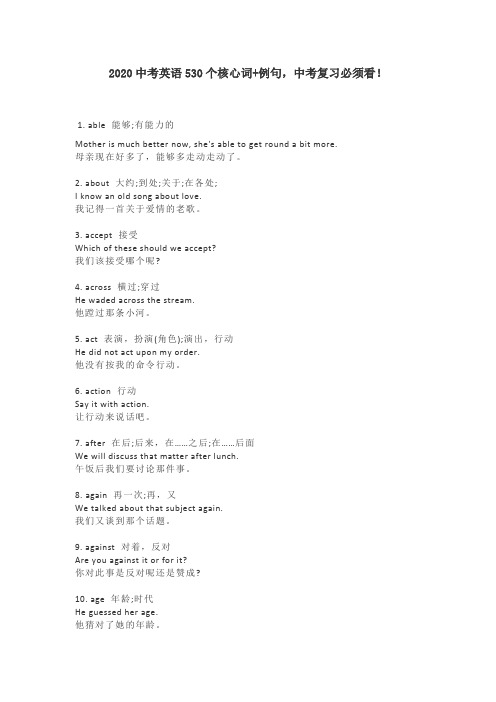
2020中考英语530个核心词+例句,中考复习必须看!1. able 能够;有能力的Mother is much better now, she's able to get round a bit more.母亲现在好多了,能够多走动走动了。
2. about 大约;到处;关于;在各处;I know an old song about love.我记得一首关于爱情的老歌。
3. accept 接受Which of these should we accept?我们该接受哪个呢?4. across 横过;穿过He waded across the stream.他蹚过那条小河。
5. act 表演,扮演(角色);演出,行动He did not act upon my order.他没有按我的命令行动。
6. action 行动Say it with action.让行动来说话吧。
7. after 在后;后来,在……之后;在……后面We will discuss that matter after lunch.午饭后我们要讨论那件事。
8. again 再一次;再,又We talked about that subject again.我们又谈到那个话题。
9. against 对着,反对Are you against it or for it?你对此事是反对呢还是赞成?10. age 年龄;时代He guessed her age.他猜对了她的年龄。
11. ago 以前He died two months ago.他两个月前去世了。
12. agree 同意;应允I must agree your plans.我应该赞成你的计划。
13. air 空气;大气We air the bedrooms every day.我们每天给卧室通通风。
14. all 全部地,总;整They were all there except me.除了我以外他们都在那里。

初中英语重点词汇例句初中英语重点词汇例句温馨提示:这些四会单词不仅要熟记,还要注意他们在句子里的使用,掌握这些四会单词形式变化。
中考单词拼写只考这些四会单词,同学们要引起充分重视。
对于这些单词要一个一个过关,每背完一个删掉一个。
Aa bit有点儿 a bit of 后跟名词 a bit of houseworkI feel a bit/a lonely from time to time 我偶尔因为感到有点儿孤独。
a little 有点儿,(比…)稍微…可修饰比较级It’s 10 a.m.. I feel a little hungry.上午10点了,我感到有点饿。
Lily is 1.65 metres tall. I am 1.63 metres tall. Lily is a little taller than I.Lily1.65米高。
我1.63米高。
Lily比我高一点。
2、ability n. 能力be able to doDifferent people have different abilities. Find out more about his abilities.不同的人有不同的能力。
3、above prep. 在…的上面Wilson lives two floors above Wendy.Wilson住在Wendy楼上两层。
below prep. 在…的下面Mary lives six floors below Wendy. Mary住在Wendy楼下6层。
over prep. 在…的上方There is a bridge over the river.有一座桥横跨这条河。
under prep. 在…的下方There is a bike under the tree.有一辆自行车在树下。
on prep. 在…的上面 oThere is a book on the desk.桌上有一本书。
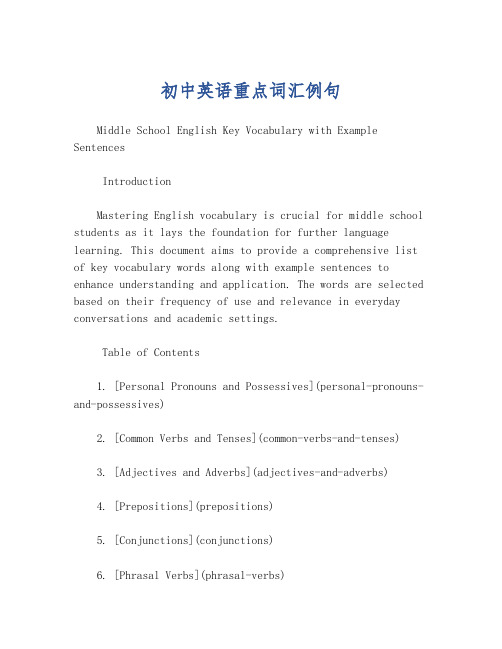
初中英语重点词汇例句Middle School English Key Vocabulary with Example SentencesIntroductionMastering English vocabulary is crucial for middle school students as it lays the foundation for further language learning. This document aims to provide a comprehensive list of key vocabulary words along with example sentences to enhance understanding and application. The words are selected based on their frequency of use and relevance in everyday conversations and academic settings.Table of Contents1. [Personal Pronouns and Possessives](personal-pronouns-and-possessives)2. [Common Verbs and Tenses](common-verbs-and-tenses)3. [Adjectives and Adverbs](adjectives-and-adverbs)4. [Prepositions](prepositions)5. [Conjunctions](conjunctions)6. [Phrasal Verbs](phrasal-verbs)7. [Idiomatic Expressions](idiomatic-expressions)Personal Pronouns and PossessivesPersonal pronouns are used to replace nouns and can refer to the speaker, the listener, or others.- Example Sentences:- She is reading a book. (Subject pronoun)- The book is on the table; it looks interesting. (Subject and object pronoun)- This is my backpack, and that is yours. (Possessive pronouns)Common Verbs and TensesVerbs describe actions or states of being. Tensesindicate when the action or state occurs.- Example Sentences:- I walk to school every day. (Present Simple)- She was crying when I saw her. (Past Simple)- We are having a party tonight. (Present Continuous)- They have been to Japan twice. (Present Perfect)Adjectives and AdverbsAdjectives describe nouns, while adverbs describe verbs, adjectives, or other adverbs.- Example Sentences:- The happy child played all day. (Adjective)- She sings beautifully. (Adverb of manner)- He suddenly stood up and left the room. (Adverb of time)PrepositionsPrepositions are used to show the relationship between a noun or pronoun and other words in a sentence.- Example Sentences:- The cat is under the table. (Location)- We will discuss the matter after lunch. (Time)- She is responsible for the project. (Relationship)ConjunctionsConjunctions connect words, phrases, or clauses.- Example Sentences:- And is used to connect two similar things or ideas: She likes to play the piano and the guitar.- But is used to show contrast: I wanted to go swimming, but it was too cold.Phrasal VerbsPhrasal verbs are verbs combined with prepositions or adverbs to give a different meaning.- Example Sentences:- Look up (to search for information): If you don'tknow a word, you can look it up in the dictionary.- Come over (to visit): Please come over to my housethis weekend.Idiomatic ExpressionsIdioms are phrases that have a meaning that is different from the literal meaning of the individual words.- Example Sentences:- Break a leg (good luck): I hope you break a leg inyour performance tonight.- A piece of cake (something is very easy): The math test was a piece of cake for him.ConclusionUnderstanding and using these key vocabulary words effectively can significantly improve a middle school student's English proficiency. Practice using these words in different contexts to reinforce their meanings and applications.Note: This document is designed to be a starting point for learning and should be expanded upon with additional vocabulary and example sentences to meet the needs of a comprehensive study plan.。
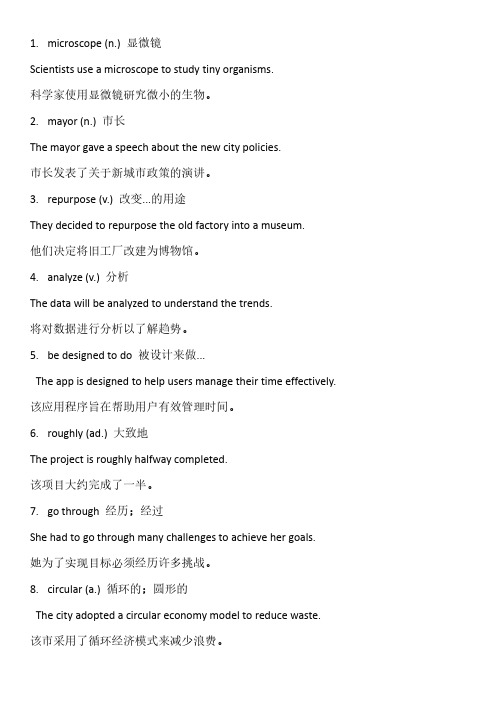
1.microscope(n.)显微镜Scientists use a microscope to study tiny organisms.科学家使用显微镜研究微小的生物。
2.mayor(n.)市长The mayor gave a speech about the new city policies.市长发表了关于新城市政策的演讲。
3.repurpose(v.)改变...的用途They decided to repurpose the old factory into a museum.他们决定将旧工厂改建为博物馆。
4.analyze(v.)分析The data will be analyzed to understand the trends.将对数据进行分析以了解趋势。
5.be designed to do被设计来做...The app is designed to help users manage their time effectively.该应用程序旨在帮助用户有效管理时间。
6.roughly(ad.)大致地The project is roughly halfway completed.该项目大约完成了一半。
7.go through经历;经过She had to go through many challenges to achieve her goals.她为了实现目标必须经历许多挑战。
8.circular(a.)循环的;圆形的The city adopted a circular economy model to reduce waste.该市采用了循环经济模式来减少浪费。
9.linear(a.)线性的The growth of the company was not linear but rather exponential.公司的增长不是线性的,而是指数型的。
10.resource(n.)资源Water is a valuable natural resource.水是一种宝贵的自然资源。
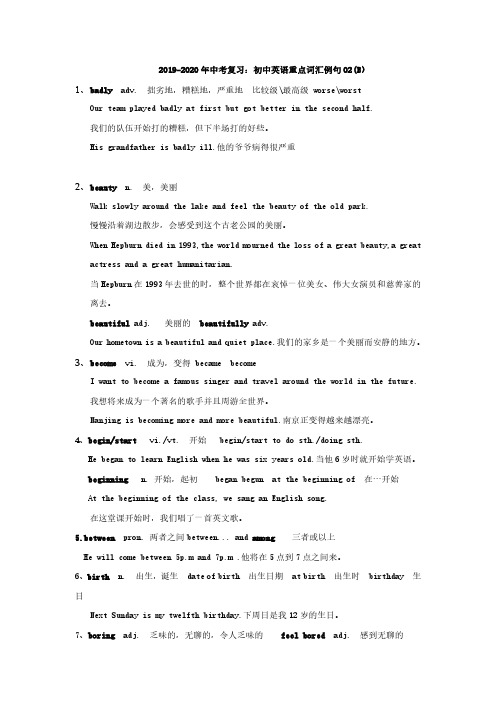
2019-2020年中考复习:初中英语重点词汇例句02(B)1、badly adv.拙劣地,糟糕地,严重地比较级\最高级worse\worstOur team played badly at first but got better in the second half.我们的队伍开始打的糟糕,但下半场打的好些。
His grandfather is badly ill.他的爷爷病得很严重2、beauty n.美,美丽Walk slowly around the lake and feel the beauty of the old park.慢慢沿着湖边散步,会感受到这个古老公园的美丽。
When Hepburn died in1993,the world mourned the loss of a great beauty,a great actress and a great humanitarian.当Hepburn在1993年去世的时,整个世界都在哀悼一位美女、伟大女演员和慈善家的离去。
beautiful adj.美丽的beautifully adv.Our hometown is a beautiful and quiet place.我们的家乡是一个美丽而安静的地方。
3、become vi.成为,变得became becomeI want to become a famous singer and travel around the world in the future.我想将来成为一个著名的歌手并且周游全世界。
Nanjing is becoming more and more beautiful.南京正变得越来越漂亮。
4、begin/start vi./vt.开始begin/start to do sth./doing sth.He began to learn English when he was six years old.当他6岁时就开始学英语。
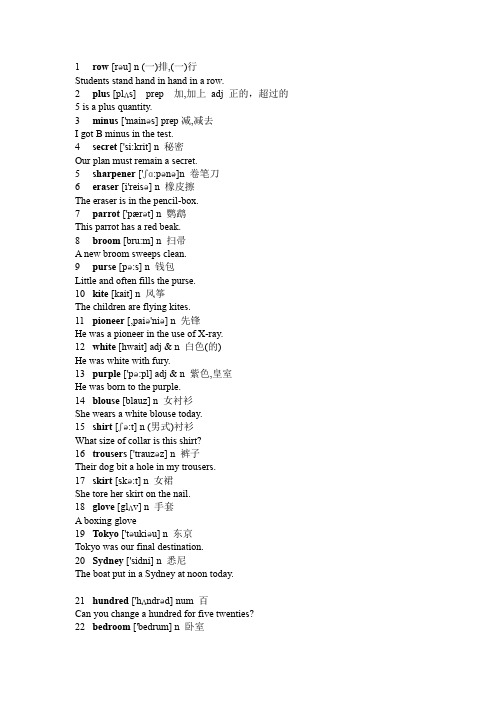
1 row [rəu] n (一)排,(一)行Students stand hand in hand in a row.2 plus [plʌs] prep 加,加上adj 正的,超过的5 is a plus quantity.3 minus ['mainəs] prep减,减去I got B minus in the test.4 secret ['si:krit] n 秘密Our plan must remain a secret.5 sharpener ['ʃɑ:pənə]n 卷笔刀6 eraser [i'reisə] n 橡皮擦The eraser is in the pencil-box.7 parrot ['pærət] n 鹦鹉This parrot has a red beak.8 broom [bru:m] n 扫帚A new broom sweeps clean.9 purse [pə:s] n 钱包Little and often fills the purse.10 kite [kait] n 风筝The children are flying kites.11 pioneer [,paiə'niə] n 先锋He was a pioneer in the use of X-ray.12 white [hwait] adj & n 白色(的)He was white with fury.13 purple ['pə:pl] adj & n 紫色,皇室He was born to the purple.14 blouse [blauz] n 女衬衫She wears a white blouse today.15 shirt [ʃə:t] n (男式)衬衫What size of collar is this shirt?16 trousers ['trauzəz] n 裤子Their dog bit a hole in my trousers.17 skirt [skə:t] n 女裙She tore her skirt on the nail.18 glove [glʌv] n 手套A boxing glove19 Tokyo ['təukiəu] n 东京Tokyo was our final destination.20Sydney ['sidni] n 悉尼The boat put in a Sydney at noon today.21 hundred ['hʌndrəd] num 百Can you change a hundred for five twenties?22 bedroom ['bedrum] n 卧室My bedroom is just above.23 funny ['fʌni] adj 滑稽的,有趣的The story was very funny.24 Tuesday ['tju:zdi] n 星期二School will begin next Tuesday.25 February ['februəri] n 二月He left the city last February.26 juice [dʒu:s] n (水果;蔬菜;肉等的)汁;水汁I like to drink coconut juice.27 tape [teip] n 磁带We have taped the wedding.28 tick [tik] n (钟表等滴嗒的)声音The clock ticks very loudly.29 wardrobe ['wɔ:drəub] n 衣柜The wardrobe takes up too much space.30 sock [sɔk] n 短袜The is hole in my sock.31 goodness ['gudnis] n 善良;美德Thank goodness!32 mend [mend] v 修补;修理The patient is mending well.33 knife [naif] n (pl.knives) 小刀Cut the beef with your table knife.34 robot ['rəubɔt] n 机器人Japanese industry is making increasing use of robots.35 thirsty ['θə:sti] adj 口渴的The fields are thirsty for rain.36 porridge ['pɔridʒ] n 粥;稀饭I had a bowl of porridge for breakfast.37 dumpling ['dʌmpliŋ] n 饺子I feel like having some dumpling.38 hamburger ['hæmbə:gə] n 汉堡包She ordered a hamburger and French fries.39 noodle ['nu:dl] n 面条Chinese food is often served with rice or noodles. 40 potato [pə'teitəu] n pl.potatoes 马铃薯;土豆Stick the fork into the potato.41 cream [kri:m] n 奶油;乳脂Have some cream in your coffee.42 ski [ski:] v 滑雪They often go skiing in December.43 skate [skeit] v 滑冰,溜冰My brother skates well.44 volleyball ['vɔli,bɔ:l] n 排球V olleyball is a sport of which I am very fond.45 postal ['pəustəl] adj 邮政的The postal system had to be changed.46 vegetable ['vedʒitəbl] n 蔬菜Is a tomato a fruit or a vegetable?47 Wednesday ['wenzdi] n 星期三I have an appointment on Wednesday.48 Thursday ['θə:zdi] n 星期四The meeting is scheduled for Thursday.49 Saturday ['sætədi] n 星期六Saturday afternoons go by like lightning!50 dictionary ['dikʃəneri] n 字典;词典That dictionary belongs to me.51 yeah [jɛə] adv (口语)是的;嗯Oh, yeah?52 straight [streit] adj 直的Come straight away after school.53 UK n 联合王国United KingdomUK national gets the vote at 18.54 USA n 美国United States of AmericaAre the Hawaiian Islands a dependence of the USA?55 Australia [ɔ:s'treiljə] n 澳大利亚The kangaroo is a native of Australia.56 Australian [ɔ:s'treiljən]adj 澳大利亚人Are they American or Australian?57 Canadian [kə'neidiən] n 加拿大人Canadian families have a lot of leisure time.58 Toronto [tə'rɔntəu] n 多伦多(加拿大港市)Soon she was fighting a road plan in Toronto.59 postcard ['pəust,kɑ:d] n 明信片Did you get my postcard?60 restaurant ['restərɔnt] n 饭馆This restaurant is a family concern.61 machine [mə'ʃi:n] n 机器Can you give me an explanation of the man-machine interface?62 electronic [ilek'trɔnik] adj 电子的I like to read books on electronic music.63 fog [fɔg] n 雾I was really in a fog after the exam.64 smog[smɔg]n 烟雾Smog has thickened the air.65 artist ['ɑ:tist] n 画家,艺术家He is a notable artist.66 bridge [bridʒ] n 桥Sometimes they played bridge together.67 fridge [fridʒ] n 电冰箱She can mend the fridge by herself.68 tomato[tə'meitəu]n(pl.tomatoes)西红柿,蕃茄Would you like some tomato paste?69 onion ['ʌnjən] n 洋葱He is really good onion.70 carrot ['kærət] n 胡萝卜Have some more carrot.71 September [sep'tembə] n 九月This term will begin on September 1st.72 autumn ['ɔ:təm] n 秋天,秋季The chill of autumn is in the air.73 mooncake n 月饼I ate one quarter of a mooncake.74 October [ɔk'təubə] n. 十月Leaves begin to fall in October.75 pie [pai] n (用肉或水果做成的)馅饼That pie tastes good.76 harvest ['hɑ:vist] n 收获Farmers harvest their crops in fall.77 delicious [di'liʃəs] adj 美味的,可口的The bannock is delicious.78 pumpkin ['pʌmpkin] n 南瓜His wife made some pumpkin pies for supper.79 twelfth [twelfθ] num &adj 第十二(的)It’s on the twelfth of February.80 tractor ['træktə] n 拖拉机He drove the tractor to his farm.81 turkey ['tə:ki] n 火鸡It’s traditional in England to eat turkey on Christmas Day.82 wheat [hwi:t] n 小麦The wheat ripped in the breeze.83 bleat [bli:t] v & n 羊叫(声)The victim gave a bleat of terror.100 dolphin ['dɔlfin] n 海豚The dolphin is an intelligent animal.101 cage [keidʒ] n 笼(子),鸟笼Is it cruel to confine a bird in a cage?102 cinema ['sinimə] n 电影院,电影They streamed out of the cinema.103 theatre(theater['θiətə])['θiətə]n剧场,戏院The theatre is just about the park.104 toilet ['tɔilit] n 厕所Where is the ladies’ toilet?105 museum [mju:'ziəm] n 博物馆He works in a history museum.106 diary ['daiəri] n 日记I keep a diary every day.107 umbrella [ʌm'brelə] n 伞,雨伞Damnation! I’ve lost my umbrella.108 scientist ['saiəntist] n 科学家When will scientist conquer cancer?109 Swedish ['swi:diʃ] adj 瑞典的,瑞典人的She can understand Swedish quite well.110 journalist ['dʒə:nəlist] n记者,新闻工作者His passport says he is a journalist.111 Sweden ['swi:dən] n 瑞典He was born in Sweden.112 accident ['æksidənt] n 事故,灾难Happily! The accident was prevented.113 grape [greip] n 葡萄He cut off a bunch of grapes to entertain us. 114 tourist ['tu:rist] n 旅游者,观光者I work in a tourist agency.115 foggy ['fɔgi] adj 有雾,多雾的His ideas on this subject are a bit foggy.116 melon ['melən] n 瓜We garnished the melon with strawberry.117 plate [pleit] n 盘子,碟子He put the apples on a round plate.118 doorbell ['dɔ:bel] n 门铃Push the doorbell.119 Christmas ['krisməs] n 圣诞节Merry Christmas!120 shower ['ʃauə] n 降雨,骤雨It suddenly started to shower.121 Berlin [bə:'lin] n 柏林They were planning to move their office to Berlin.122 Moscow ['mɔskəu] n 莫斯科Moscow is the capital of Russia.123 kitchen ['kitʃin] n 厨房I guess there are mice in the kitchen.124 cupboard ['kʌbəd] n (柜)He stored foods in his cupboard.125 Indian ['indiən] n & adj 印度人(的),印第安人(的)To an Indian, the owl is symbol for bad luck!126 Italian [i'tæljən] n & adj意大利人(的),意大利语(的) Italian pizza is very popular in China.127 geography [dʒi'ɔgrəfi] n 地理(学)He studied physical geography.128 physics ['fiziks] n 物理(学) physicist physical physician He does well in physics.129 queue[kju:]n(按次序等待的人,车等的)队,行列We queued up for the bus.130 cousin ['kʌzn] n 堂(表)兄弟,堂(表)姐妹He is a distant cousin of mine.131 engineer [,endʒi'niə] n 工程师His dream is to become an engineer.132 pardon ['pɑ:dn] v 原谅(某人),宽恕I do beg your pardon.133 shine [ʃain] v 照亮,发亮He shines at golf.134 silently ['sailəntli] adv 寂静地,沉默地The car was creeping silently towards the mouse.135 relay [ri'lei] n 接力,赛跑vt. 转播,转达,接力The anchor man in a relay team runs last.136 lap [læp] n (竞赛场的)一圈,膝盖v 舔食,包围The cat lapped up the milk.137 stick [stik] n 棒,棍v 刺入,竖起,钉住,坚持I can’t stick it any more.138 congratulation[kən,grætju'leiʃən] n (常用复数)祝贺,庆贺Congratulation on you marriage139 unusual [ʌn'ju:ʒuəl]adj 不寻常的,非凡的Something unusual was about to happen.140 loudspeaker ['laud'spi:kə]n扬声器,扩音器There is a loudspeaker in a radio.141 microcomputer ['maikrəukəm'pju:tə] n 微型计算机In a microcomputer, these are both on the microcomputer chip.142 conductor [kən'dʌktə]n(汽车,电车上的)售票员,列车员She is a bus conductor.143 neighbour ['neibə] n 邻居I’ll board out my children with my neighbour.144 chemistry ['kemistri] n 化学I am not good at organic chemistry.145 sweep [swi:p] v 扫,扫地The boy helped his mother sweep away the dirt on the floor.146 politely [pə'laitli] adv 有礼貌地They try to deal politely with angry customers.147 scissors ['sizəz] n (复数)剪刀There is a pair of scissors in the bottom drawer.148 racket ['rækit] n (网球,羽毛球等的)球拍v 喧闹,花天酒地What a racket the children are making!149 wallet ['wɔlit] n 钱夹,皮夹My wallet has disappeared from the table.150 steer [stiə] n & v 驾驶,掌舵People used to steer by the stars.151 dive [daiv] v 潜入(水中),跳水What a beautiful dive!152 Titanic [tai'tænik] n 泰坦尼克(船名)The grand ship Titanic went down at her first voyage.153 Boston ['bɔstən] n 波士顿(美国马萨诸塞州的首府)This is the shortest route from Boston to New York.154 penguin['peŋgwin] n 企鹅The penguin is flightless brid.155 shellfish ['ʃelfiʃ] n 贝类,甲壳虫Fishermen here have raised shellfish for generations.156 r ub [rʌb] v 磨,擦I rubbed the window with a cloth.157 several ['sevərəl] adj & pron 几个;若干I bought several books yesterday.158 librarian [lai'brɛəriən] n 图书管理员The librarian told the student that he should return the book.159 spoil [spɔil](spoilt[spɔilt],spoil的过去式与过去分词) v 糟蹋,宠坏,溺爱n 战利品A food mother may spoil her child.160 surf [sə:f] v 冲浪I surf the internet two hours a day.161 canoe [kə'nu:] v 乘独木舟We crossed the lake in a canoe.162 so-called ['səu'kɔ:ld] adj 所谓的163 although [ɔ:l'ðəu] conj 虽然;尽管She seemed a babe although she was already thirty.164 channel ['tʃænl] n 海峡;航道;频道;波段Ships must follow the channel into the port.165 rubbish ['rʌbiʃ] n 垃圾;废物The film was rubbished by the critics.166 neighbourhood ['neibəhud] n. 四邻;街坊;邻近The whole neighbourhood praises him.167 onto ['ɔntu:] prep 在…上面;到…上面A miner’s lamp is fixed onto his helmet.168 spit(spat[spæt],spit的过去式和过去分词)[spit] v吐痰;吐唾沫It’s rude to spit in public.169 dustbin ['dʌstbin] n 垃圾箱Please put the garbage in the dustbin.170 riddle ['ridl] n 谜语He could not solve the riddle.171 practise ['præktis] v 实践;练习It is common sense to practise thrift.172 scuba ['skju:bə] n 水肺(潜水者用的水下呼吸器)I first got hooked on scuba diving when I was twelve.173 icon ['aikɔn] n 图像符号,图标Click on the icon when you want to print.174 tomb [tu:m] n 坟墓Those dead soldiers were buried in the tombs.175 edge [edʒ] n 边,边缘v 给……加上边,缓慢横过,使锋利We slowly edged our way towards the exit.176 rim [rim] n 边,缘v 形成边缘Trees rimed the pool.177 instruction [in'strʌkʃən] n 说明,须知I will take the medicine according to the instruction.178 coral ['kɔrəl] n 珊瑚I was going to wear a coral dress.179 reef [ri:f] n 岩礁The ship was wrecked on a reef.180 brochure [brəu'ʃjuə] n 小册子The computer’s features are detailed in our brochure.181 watchtower ['wɔtʃ'tauə] n 监视塔,瞭望塔The watchtower followed the aircraft by radar.182 neatly ['ni:tli] adv 整洁地Children must learn to write neatly.183 angel ['eindʒəl] n 天使,守护神She is a perfect angel.184 telegraph ['teligrɑf] n 电报vTelegraph her to come at once.185 merry ['meri] adj 愉快的;欢乐的A merry heart goes all the way.186 decorate ['dekəreit] v 装饰,修饰187 eve [i:v] n (节日或重大事件发生的)前夕The country was on the eve of the First Revolution.180 stocking ['stɔkiŋ] n 长统袜I ripped my stocking on a nail.181 chimney ['tʃimni] n 烟囱,烟筒The chimney is almost choked up with soot.182 Turkey ['tə:ki] n 土耳其A native or inhabitant of Turkey183 hang[hæŋ] v 吊着,悬挂Her hair hung long in the back.184 fireplace ['faiəpleis] n 壁炉Books and a fireplace lent a feeling of warmth to the room.185 generosity [,dʒenə'rɔsiti] n 慷慨,豁达I appreciate your generosity in this matter.186 barn [bɑ:n] n 谷仓,堆物房;马房,牛舍We took shelter from the storm in a barn.187 shepherd ['ʃepəd] n 牧羊人The farmer has a shepherd dog.188 dinosaur ['dainəsɔ:] n 恐龙The natural history museum has a special exhibition of dinosaur. 189 aeroplane ['ɛərəplein] n 飞机He flew the aeroplane over to Germany.190 camera ['kæmərə] n 照相机This wall will do as a rest of your camera.191 digital ['didʒitəl] adj 数字似的I just looked at the digital map.192 bamboo [bæm'bu:] n 竹子The piece of bamboo makes a musical sound.193 worm n 虫,蠕虫A variant on the virus is the worm.194 fossil ['fɔsl] n 化石I can’t date the fossil exactly.195 feather ['feðə] n 羽毛Birds of a feather flock together.196 fragile ['frædʒil] adj 易碎的Human happiness is so fragile.197 teapot ['ti:pɔt] n 茶壶The teapot has one handle standing out.198 drought [draut] n 旱灾,干旱The long drought famished many people.199 slipper ['slipə] n (常用复数)拖鞋,便鞋No slipper is allowed in the library.200 beeper ['bi:pə] n 袖珍无线电传呼机,电话呼叫机Do you have a beeper?201 document ['dɔkjumənt] n 公文,文件The official document was misworded.202 monitor ['mɔnitə] n 显示器, 班长v 监视This kind of monitor releases low radiation.203 universe ['ju:nivə:s] n 宇宙The depth of the universe is immeasurable.204 satellite ['sætəlait] n 卫星They have launched a man-made satellite successfully.205 multiply ['mʌltiplai] v (将…)乘…adv 多样地,多重地Multiply y by infinity.206 shut [ʃʌt] v 关(门等)The plant shut down for the strike.207 decorate ['dekəreit] v 装饰,修饰It’s necessary to decorate the classroom.208 woolen ['wulin] adj 羊毛的,毛织Will this woolen sweater shrink when washed?209 leather ['leðə] n 皮革This wallet feels to me like leather.210 yen [jen] n 元,日元I received no less than ten thousand yen for my work.211 screen [skri:n] n 屏幕It is the moved screen in the play.212 rewarding [ri'wɔ:diŋ] adj 值得作的,有益的It is very rewarding to keep a diary of the daily happenings.213 wag [wæg] v 摆动,摇动(尾巴等)The dog’s tail wagged.214 tail [teil] n 尾巴,尾部, 辫子v 追踪,尾随The children tailed after the parade.215 Scotland ['skɔtlənd] n 苏格兰He owns a large estate in Scotland.216 vet [vet] n (口语)兽医I’ve tried every treatment the vet suggested.217 heal [hi:l] v 使(伤、病)痊愈的This wound will soon heal if you keep it clean.218 injection [in'dʒekʃən] n 注射,打针The doctor gave her an injection to alleviate the pain.219 grab [græb] v 抓取…,夺取When I gave him the chance, he grabbed it at once.220 steal(stole[stəul],过去式;stolen['stəulən],过去分词) [sti:l] v 偷,窃取He stole a glance at the pretty girl across the table.221 inspector [in'spektə] n 警官,监督员The tax inspector agreed the figure.222 freeze [fri:z] (froze [frəuz], frozen ['frəuzn]) v 结冰,凝结The government has introduced a wage freeze.223 alive [ə'laiv] adj 活着的, 有活力的,注意到的Although he is eighty, he is still very much alive.224 steep [sti:p] adj 陡峭的,险峻的v 浸泡They climbed the steep mountain inch by inch.225 British ['britiʃ] adj 英国人的He speaks British English.226 mist [mist] n 雾v 使…模糊When I drink tea, my glasses mist over.227 trap [træp] v 使…陷入困境,设陷阱捕捉Some miners were trapped underground after the collapse.228 tent [tent] n 帐篷Their set up a tent near the seashore.229 robbery ['rɔbəri] n 抢劫案,抢劫He graduated from petty thief to bank robbery.。
2019-2020 年中考复习:初中英语重点词汇例句 02(B)1、badly adv. 拙劣地,糟糕地,严重地比较级\最高级 worse\worstOur team played badly at first but got better in the second half.我们的队伍开始打的糟糕,但下半场打的好些。
His grandfather is badly ill.他的爷爷病得很严重2、beauty n. 美,美丽Walk slowly around the lake and feel the beauty of the old park.慢慢沿着湖边散步,会感受到这个古老公园的美丽。
When Hepburn died in 1993,the world mourned the loss of a great beauty,a great actress and a great humanitarian.当Hepburn 在1993 年去世的时,整个世界都在哀悼一位美女、伟大女演员和慈善家的离去。
beautiful adj. 美丽的beautifully adv.Our hometown is a beautiful and quiet place.我们的家乡是一个美丽而安静的地方。
3、become vi. 成为,变得 became becomeI want to become a famous singer and travel around the world in the future.我想将来成为一个著名的歌手并且周游全世界。
Nanjing is becoming more and more beautiful.南京正变得越来越漂亮。
4、begin/start vi./vt. 开始begin/start to do sth./doing sth.He began to learn English when he was six years old.当他6 岁时就开始学英语。
beginning n. 开始,起初began begun at the beginning of 在…开始At the beginning of the class, we sang an English song.在这堂课开始时,我们唱了一首英文歌。
5.between pron. 两者之间between... and among 三者或以上He will come between 5p.m and 7p.m .他将在5 点到7 点之间来。
6、birth n. 出生,诞生date of birth 出生日期at birth 出生时birthday 生日Next Sunday is my twelfth birthday.下周日是我 12 岁的生日。
7、boring adj. 乏味的,无聊的,令人乏味的feel bored adj. 感到无聊的Mr Black’s class is boring.We all feel bored in his class.Mr Black 上的课枯燥,我们在他的课上都感到乏味。
The trip to the World Park was boring. We all felt bored on the way.去世界公园的旅行令人乏味,在路上我们都感到乏味。
8、borrow vt. (向某人)借用,借borrow sth. from sb. 向某人借某物lend vt. 借给lend sth. to sb./lend sb.sth. 把某物借给某人Excuse me,can I borrow a bike from you?/Can I borrow your bike?我能借你的自行车吗?I lent my English book to Kate yesterday.昨天我把我的英语书借给 Kate 了。
k eep 借多长时间You can keep the book for 2 weeks. 这本书你可以借2 周。
9、both pron./adj. 两者,双方,两者的,双方的neither 两者都不 either 两者中的一个Peter and I are both students. Pete 和我都是学生。
Peter and I both love playing football. Pete 和我都喜欢踢足球。
Both of us love playing football.Both he and I are hard-working.He knows both English and French.all (三者或三者以上)都none (三者或三者以上)都不All of us are students. We are all students. 我们都是学生。
We all work hard at English. 我们都努力学英语10.bread n.不可数名词I am not full, I want two more pieces of bread.我没吃饱,我还想要两快面包。
11、breath n. 呼吸 out of breath 上气不接下气breathe vt./vi. 呼吸breathe heavily 呼吸急促Daniel arrived out of breath because he missed the early bus.Daniel 上气不接下气赶到,因为他错过早班车。
A witness reported that he was breathing heavily and had blood on his shirt.一个证人报告说他呼吸急促,衬衫上有血。
12、bridge n. 桥There is a wooden bridge over the river. 有一座木桥横跨这条河。
go across the bridge /cross the bridge /walk over the bridge 过桥13、bright adj. 明亮的,聪明的My classroom is very bright.我的教室非常明亮。
He is a bright/smart/clever boy.他是一个聪明的男孩。
14、bring vt. 带来,拿来brought take vt. 拿走 took takenTake these old chairs away,and bring the new ones here.把这些旧椅子拿走,带一些新椅子来。
Remember to bring your homework here tomorrow.记得明天把你作业带来。
It’s raining outside. Please take an umbrella with you when you go out.外面正下雨。
当你出去的时候,请带一把伞。
15、build vt. 建造,建筑built building n. 建筑物,楼房We should build more reserves for giant pandas.我们应该为大熊猫建立更多的保护区。
Most of us live in tall buildings.我们中的绝大部分住在高楼里。
16、burn vt. 烧伤,烧The fire burned Zhang Hua’s neck,arms,and face.火烧伤了张华的脖子、胳膊和脸。
17、busy adj. 忙的,忙碌的be busy with /doing sth. 忙于做某事business n. 企业,商行,工厂The students are very busy these days.学生这些天非常忙。
They were busy with/ doing their homework at that time.他们那个时候忙于做作业。
We get lots of support from local businesses.我们从当地企业得到许多支持。
18、buy vt. 买buy sb. sth. /buy sth. for sb. bought boughtMy father bought me a new bike yesterday./ My father bought a new bike for me yesterday.我父亲昨天为我买了俩自行车。
sell vt. 卖,出售 sold soldHunters will make a lot of money if they sell elephants’ tusks.猎人通过卖象牙来赚钱。
19、by prep. 通过,靠,用(表示通过某种方式)by bus/ bike/ plane/air/ train/ ship/sea/underground/boatby doing sth.Now we can take an underground to the centre of Nanjing.Now we can go to the centre of Nanjing by underground.现在我们可以乘地铁到南京市中心。
We go to school by bike every day.We ride bikes to school every day.我们每天骑自行车上学。
She wanted to remind us that we should protect the environment by showing us the beauty of nature.她想通过向我们展示大自然的美来提醒我们应该保护环境。
2019-2020 年中考复习:初中英语重点词汇例句 03(C)1.call vt.把……叫做/给命名We call him Tom.The boy is called Tom.这个男孩名叫 TomThere is a boy called Tom in my class.\ Jerry is calling the police for help.在我班上有一个名叫 Tom 的男孩。
Jerry 在打电话给警察寻求帮助。
2.calm vi.平静下来,镇静下来 adj.平静的calm down 静下来Some colours like blue and white make us calm and peaceful.蓝色和白色等颜色使我们安静。
We should calm down when the earthquake happens.当地震发生时,我们应该镇静。